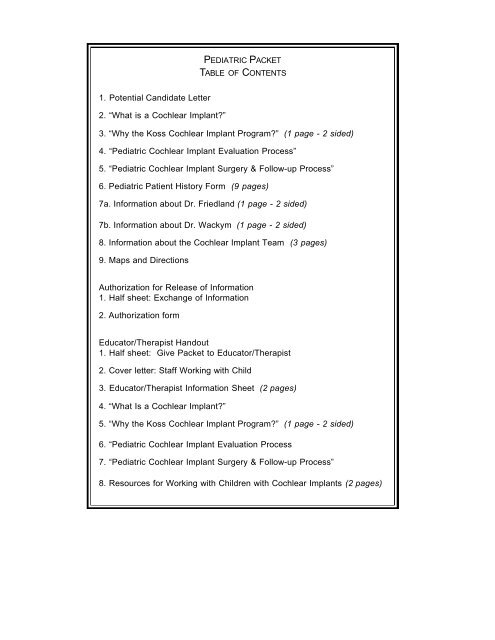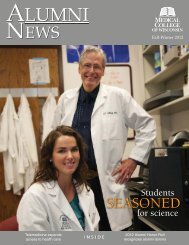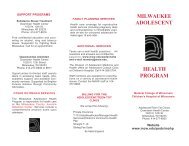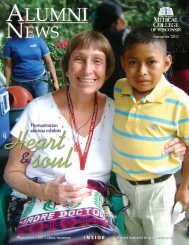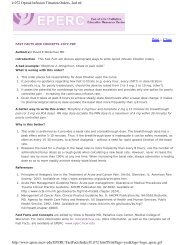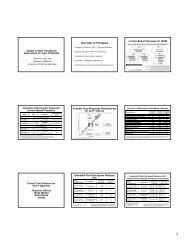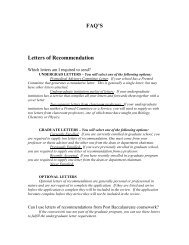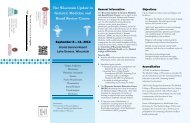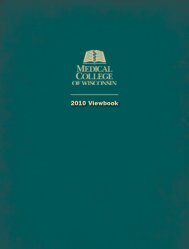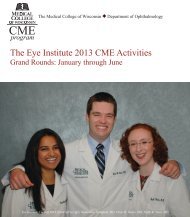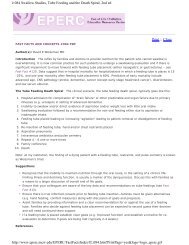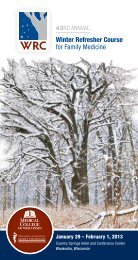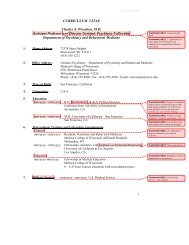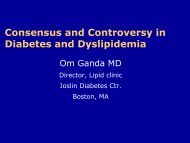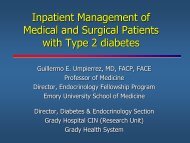Pediatric Cochlear Implant Packet - Medical College of Wisconsin
Pediatric Cochlear Implant Packet - Medical College of Wisconsin
Pediatric Cochlear Implant Packet - Medical College of Wisconsin
Create successful ePaper yourself
Turn your PDF publications into a flip-book with our unique Google optimized e-Paper software.
PEDIATRIC PACKET<br />
TABLE OF CONTENTS<br />
1. Potential Candidate Letter<br />
2. “What is a <strong>Cochlear</strong> <strong>Implant</strong>?”<br />
3. “Why the Koss <strong>Cochlear</strong> <strong>Implant</strong> Program?” (1 page - 2 sided)<br />
4. “<strong>Pediatric</strong> <strong>Cochlear</strong> <strong>Implant</strong> Evaluation Process”<br />
5. “<strong>Pediatric</strong> <strong>Cochlear</strong> <strong>Implant</strong> Surgery & Follow-up Process”<br />
6. <strong>Pediatric</strong> Patient History Form (9 pages)<br />
7a. Information about Dr. Friedland (1 page - 2 sided)<br />
7b. Information about Dr. Wackym (1 page - 2 sided)<br />
8. Information about the <strong>Cochlear</strong> <strong>Implant</strong> Team (3 pages)<br />
9. Maps and Directions<br />
Authorization for Release <strong>of</strong> Information<br />
1. Half sheet: Exchange <strong>of</strong> Information<br />
2. Authorization form<br />
Educator/Therapist Handout<br />
1. Half sheet: Give <strong>Packet</strong> to Educator/Therapist<br />
2. Cover letter: Staff Working with Child<br />
3. Educator/Therapist Information Sheet (2 pages)<br />
4. “What Is a <strong>Cochlear</strong> <strong>Implant</strong>?”<br />
5. “Why the Koss <strong>Cochlear</strong> <strong>Implant</strong> Program?” (1 page - 2 sided)<br />
6. “<strong>Pediatric</strong> <strong>Cochlear</strong> <strong>Implant</strong> Evaluation Process<br />
7. “<strong>Pediatric</strong> <strong>Cochlear</strong> <strong>Implant</strong> Surgery & Follow-up Process”<br />
8. Resources for Working with Children with <strong>Cochlear</strong> <strong>Implant</strong>s (2 pages)
Dear Parent/Guardian:<br />
Thank you for inquiring about our cochlear implant program. Please find<br />
enclosed the following information:<br />
• What is a cochlear implant?<br />
• Why the Koss <strong>Cochlear</strong> <strong>Implant</strong> Program?<br />
• <strong>Cochlear</strong> implant evaluation, surgery, and follow-up process<br />
• The cochlear implant team members<br />
• Patient History Form<br />
• <strong>Packet</strong> for child’s educator/therapist<br />
• Release <strong>of</strong> information form<br />
• Maps and directions to the Otolaryngology Children’s Office<br />
Building Clinic<br />
Please review the information and fill out the “Patient Information Form.”<br />
Return the form along with any past aided or unaided audiograms.<br />
This information is very beneficial when we talk with you regarding<br />
cochlear implantation.<br />
If you have any questions, feel free to contact us at 414-805-5586.<br />
Koss <strong>Cochlear</strong> <strong>Implant</strong> Program<br />
<strong>Medical</strong> <strong>College</strong> <strong>of</strong> <strong>Wisconsin</strong><br />
Department <strong>of</strong> Otolaryngology and Communication Sciences<br />
Froedtert West Clinics<br />
9200 West <strong>Wisconsin</strong> Avenue<br />
Milwaukee, WI 53226
Working in conjunction<br />
Children's Hospital <strong>of</strong> <strong>Wisconsin</strong> - <strong>Pediatric</strong> Patients<br />
Froedtert Hospital - Adult Patients<br />
WHAT IS A COCHLEAR IMPLANT?<br />
A cochlear implant is designed to provide electrical stimulation to the hearing nerve fibers by by passing the hair cells in<br />
the cochlea that are damaged or absent for individuals with sensorineural hearing loss. The function <strong>of</strong> the cochlear<br />
implant is to use this electrical stimulation to provide individuals who have severe to pr<strong>of</strong>ound sensorineural hearing losses<br />
with an auditory signal that they interpret as sound. It is a prosthetic hearing device, not a hearing aid.<br />
How does a cochlear implant work?<br />
A cochlear implant consists <strong>of</strong> both externally worn and surgically<br />
implanted components.<br />
• The microphone picks up sound and sends it to the speech<br />
processor.<br />
• The speech processor (body worn or ear-level) analyzes and<br />
codes the signal.<br />
• The coded signal is sent to the transmitter that is worn in the<br />
hair.<br />
• The transmitter sends the signal across the skin to the internal<br />
device and stimulates the auditory nerve fibers. The brain<br />
interprets the signal as sound.<br />
Transmitter<br />
Ear Level<br />
Speech Processor<br />
Microphone<br />
Internal Device<br />
Auditory<br />
Nerve<br />
Who can benefit from a cochlear implant?<br />
• Adults and children with severe to pr<strong>of</strong>ound sensorineural<br />
hearing loss in both ears.<br />
• Children who are 12 months (younger in some cases) to 18<br />
years <strong>of</strong> age and adults <strong>of</strong> any age.<br />
• Individuals who receive insufficient benefit from hearing aids.<br />
• Children who can receive family and educational support.<br />
• Individuals and families with appropriate expectations and an understanding <strong>of</strong> the necessary follow-up.<br />
Electrical<br />
Pulses<br />
What cochlear implant systems are available?<br />
At the present time there are three manufacturers <strong>of</strong> cochlear implants for children and adults:<br />
• Advanced Bionics<br />
• <strong>Cochlear</strong> Americas<br />
• Med-El Corporation<br />
All three companies have excellent implant systems. As a part <strong>of</strong> the evaluation process, we discuss the function and<br />
benefits <strong>of</strong> each device with the candidate and their family.<br />
Who can I call if I have questions?<br />
Feel free to contact any audiologist or speech-language pathologist on the cochlear implant team. If they can't answer your<br />
question, they will be able to get you in touch with someone who can.<br />
Adult <strong>Cochlear</strong> <strong>Implant</strong><br />
Audiologist<br />
Adult <strong>Cochlear</strong> <strong>Implant</strong><br />
Speech-Language Pathologist<br />
<strong>Pediatric</strong> <strong>Cochlear</strong> <strong>Implant</strong><br />
Audiologist<br />
<strong>Pediatric</strong> <strong>Cochlear</strong> <strong>Implant</strong><br />
Speech-Language Pathologist<br />
414-805-5586<br />
414-805-5586<br />
414-266-2685<br />
414-266-2685<br />
Linda Burg, AuD, CCC-A<br />
Jamie Jensen, AuD, CCC-A<br />
Mary Brawley, MA, CCC-SLP<br />
Karla Balko, MS, CCC-A<br />
Sarah Drake, MS, CCC-A<br />
Dione Langley, MS, CCC-SLP<br />
Jay Berghaurer, MS, CCC-SLP<br />
Koss <strong>Cochlear</strong> <strong>Implant</strong> Program<br />
<strong>Medical</strong> <strong>College</strong> <strong>of</strong> <strong>Wisconsin</strong><br />
9200 West <strong>Wisconsin</strong> Avenue - Milwaukee, <strong>Wisconsin</strong> 53226<br />
<strong>Pediatric</strong> (414) 266-2685 - Adult (414) 805-5586 - Email: cochlear.implant@mcw.edu
Working in conjunction<br />
Children's Hospital <strong>of</strong> <strong>Wisconsin</strong> - <strong>Pediatric</strong> Patients<br />
Froedtert Hospital - Adult Patients<br />
WHY THE KOSS COCHLEAR IMPLANT PROGRAM?<br />
Advanced Technology<br />
The Koss <strong>Cochlear</strong> <strong>Implant</strong> Program is the only program in the state <strong>of</strong> <strong>Wisconsin</strong> that has been selected by all<br />
three cochlear implant manufacturers to participate in their investigational trials. This allows our patients<br />
access to the most recent technology as well as a large selection <strong>of</strong> devices. The program is the largest in the<br />
state <strong>of</strong> <strong>Wisconsin</strong>. We currently follow over 400 patients from <strong>Wisconsin</strong> and the surrounding states.<br />
Experienced Staff<br />
The staff on the Koss <strong>Cochlear</strong> <strong>Implant</strong> Team has extensive experience working with individuals with<br />
hearing loss, in particular, those with cochlear implants. The years <strong>of</strong> experience range up to 15 years, and<br />
include both pediatric and adult expertise.<br />
Comprehensive Patient Care<br />
In addition to <strong>of</strong>fering patients the latest technology and device selection, we have an emphasis on<br />
comprehensive patient care. Patients and their families receive this care throughout the evaluation, surgical,<br />
and initial post-implant process. In addition, we provide long-term follow-up care, as clients become<br />
experienced cochlear implant users. This care includes:<br />
• Device programming<br />
• Aural rehabilitation<br />
• Speech-language evaluation<br />
• Patient and family support groups<br />
• Educational consultation & collaboration<br />
• Post-implant communication assessment<br />
• Coordination with local service providers<br />
Research<br />
Another important component <strong>of</strong> the program is the ongoing hearing research. Here is a brief sample <strong>of</strong> our<br />
investigational trials and other areas <strong>of</strong> ongoing research:<br />
• The use <strong>of</strong> a “hybrid” device that is a combination <strong>of</strong> cochlear implant and hearing<br />
aid. This device is designed for individuals with pr<strong>of</strong>ound sensorineural hearing<br />
loss in the high frequencies. The cochlear implant portion provides electrical<br />
hearing for the high pitches and the hearing aid provides amplification for the low<br />
and middle pitches.<br />
• <strong>Cochlear</strong> implantation in a deaf ear when the other ear is normal or has mild<br />
hearing impairment.<br />
• Effects <strong>of</strong> cochlear implantation on suppression <strong>of</strong> tinnitus.<br />
• Relationships between genetics and hearing loss in families and in clinical populations.<br />
See article: “Koss Endows $1 Million Chair; <strong>College</strong> Names First Recipient” on next page.<br />
Koss <strong>Cochlear</strong> <strong>Implant</strong> Program<br />
<strong>Medical</strong> <strong>College</strong> <strong>of</strong> <strong>Wisconsin</strong><br />
9200 West <strong>Wisconsin</strong> Avenue - Milwaukee, <strong>Wisconsin</strong> 53226<br />
<strong>Pediatric</strong> (414) 266-2685 - Adult (414) 805-5586 - Email: cochlear.implant@mcw.edu
Koss Endows $1 Million Chair; <strong>College</strong> Names First Recipient<br />
Article from the World, the <strong>Medical</strong> <strong>College</strong> <strong>of</strong> <strong>Wisconsin</strong> newsletter for faculty and staff - July 17, 2000<br />
P. Ashley Wackym, MD, is the first recipient <strong>of</strong> the John C. Koss Pr<strong>of</strong>essorship <strong>of</strong> Otolaryngology<br />
and Communication Sciences at the <strong>Medical</strong> <strong>College</strong> <strong>of</strong> <strong>Wisconsin</strong>. He became Pr<strong>of</strong>essor and<br />
Chairman <strong>of</strong> Otolaryngology and Communication Sciences in 1998.<br />
The chair is endowed by a $1 million combined gift from John C. Koss and the Milwaukee-based<br />
Koss Corporation. John Koss is credited with creating the high-fidelity stereo headphone<br />
industry in the late 1950's.<br />
"We are pleased and very grateful that the Koss family has strengthened its long term relationship<br />
with the <strong>Medical</strong> <strong>College</strong> <strong>of</strong> <strong>Wisconsin</strong> through this endowment," said T. Michael Bolger,<br />
JD, President and CEO. "A chair is the highest honor the <strong>College</strong> can bestow on a physician or<br />
scientist. Dr. Wackym has many accomplishments to his credit deserving <strong>of</strong> the honor."<br />
"The John C. Koss Chair will allow major expansion <strong>of</strong> our work in cochlear implantation," Dr.<br />
Wackym said. I am passionate about caring for these patients, and am humbled on a daily basis<br />
by what these prospective devices can provide to people with significant hearing loss,<br />
particularly children."<br />
A growing number <strong>of</strong> people are no longer isolated by pr<strong>of</strong>ound hearing loss thanks to the Koss<br />
<strong>Cochlear</strong> <strong>Implant</strong> Program, according to Dr. Wackym. His surgical teams at Froedtert Hospital<br />
and Children's Hospital <strong>of</strong> <strong>Wisconsin</strong> are the only ones in the state capable <strong>of</strong> implanting all<br />
three <strong>of</strong> the cochlear implant devices currently on the market. The implants restore hearing by<br />
directly stimulating the ear's cochlear nerve, and his team is now researching methods to <strong>of</strong>fer<br />
the implants to a wider range <strong>of</strong> candidates.<br />
"I have personally had the opportunity to observe Dr. Wackym's dedication to his patients," says<br />
Michael Koss, president and CEO <strong>of</strong> Koss Corp. "I have witnessed two cochlear implant<br />
surgeries performed by Dr. Wackym within the Koss <strong>Cochlear</strong> <strong>Implant</strong> Program. The<br />
revolutionary new techniques used to treat these patients are surpassed only by the personal<br />
care given them by the team. The sum total <strong>of</strong> both has been awe-inspiring."<br />
In 1980, Koss Corp. helped fund the <strong>Medical</strong> <strong>College</strong> Koss Hearing and Balance Center. Koss<br />
Corporation is also developing noise-canceling headphones that can be worn by patients<br />
undergoing MRI scans. These phones minimize the loud clicking noises made by the scanner,<br />
which can make the experience <strong>of</strong> an MRI unpleasant. The phones will be tested at the <strong>Medical</strong><br />
<strong>College</strong>.<br />
Dr. Wackym's department conducts research in and treatment for a variety <strong>of</strong> disorders <strong>of</strong> the<br />
head and neck, sinus, throat and ear, including cancer, as well as surgery for hearing, balance or<br />
facial nerve disorders.
Working in conjunction<br />
Children's Hospital <strong>of</strong> <strong>Wisconsin</strong> - <strong>Pediatric</strong> Patients<br />
Froedtert Hospital - Adult Patients<br />
PEDIATRIC COCHLEAR IMPLANT EVALUATION PROCESS<br />
Initial inquiry or referral can be made by:<br />
• Family Member<br />
• Audiologist<br />
• Therapist<br />
• Teacher<br />
• <strong>Pediatric</strong>ian<br />
• Other<br />
Information sharing:<br />
• An information packet will be mailed to the family.<br />
• Complete the history information form included in the packet.<br />
• Return this form along with copies <strong>of</strong> the child’s most recent audiograms to:<br />
Jane Kellerman, Administrative Assistant<br />
Department <strong>of</strong> Otolaryngology & Communication Sciences<br />
Koss <strong>Cochlear</strong> <strong>Implant</strong> Program<br />
9200 West <strong>Wisconsin</strong> Avenue<br />
Milwaukee, WI 53226<br />
• If there are questions, call 414.805.5586 or e-mail: jkellerm@mcw.edu<br />
• An audiologist will review the information sent to us.<br />
• You will be contacted for an appointment.<br />
Consultation with cochlear implant audiologist:<br />
• Audiological and speech perception testing<br />
• Discuss how cochlear implants work<br />
• Explain the latest technology<br />
• Discuss factors that can affect the candidate’s performance with a cochlear implant<br />
• Discuss reasonable post-implant expectations<br />
• Review post-implant follow-up appointments<br />
CT and surgeon appointments will be made.<br />
<strong>Medical</strong> exam with surgeon:<br />
• History and physical examination<br />
• Review <strong>of</strong> audiologic testing data<br />
• Review and interpretation <strong>of</strong> CTs<br />
• <strong>Medical</strong> diagnosis <strong>of</strong> the hearing loss<br />
• Discussion <strong>of</strong> appropriateness <strong>of</strong> candidacy<br />
• Review <strong>of</strong> surgical procedures<br />
<strong>Cochlear</strong> implant decision-making:<br />
• Decisions regarding surgery are made by the candidate along with the cochlear implant team.<br />
• Device discussion with audiologist to choose which cochlear implant device you will be implanted with.<br />
Koss <strong>Cochlear</strong> <strong>Implant</strong> Program<br />
<strong>Medical</strong> <strong>College</strong> <strong>of</strong> <strong>Wisconsin</strong><br />
9200 West <strong>Wisconsin</strong> Avenue - Milwaukee, <strong>Wisconsin</strong> 53226<br />
<strong>Pediatric</strong> (414) 266-2685 - Adult (414) 805-5586 - Email: cochlear.implant@mcw.edu
Working in conjunction<br />
Children's Hospital <strong>of</strong> <strong>Wisconsin</strong> - <strong>Pediatric</strong> Patients<br />
Froedtert Hospital - Adult Patients<br />
PEDIATRIC COCHLEAR IMPLANT SURGERY & FOLLOW-UP PROCESS<br />
Once the decision is made to have cochlear implant surgery:<br />
• Pre-authorization from the insurance company for the surgery is needed. Most commercial insurance<br />
companies, as well as Medicare and T19, cover cochlear implants. This may take up to six weeks to authorize.<br />
• Once we have received a hard copy <strong>of</strong> the insurance approval, a surgery date is scheduled.<br />
• Surgery is usually an inpatient procedure which involves an overnight hospital stay.<br />
• The typical cochlear implant surgery takes about two to five hours. This includes testing the device itself, to<br />
confirm each patient has a functioning unit. Electrophysiologic testing is done to evaluate each person’s<br />
responsiveness to stimulation via the cochlear implant.<br />
Post-operative appointments:<br />
• “Hook-Up” is about four weeks after the surgery (3 hour appointment)<br />
- Patient will receive the external equipment and will have the initial programming <strong>of</strong> the speech processor<br />
- Overview <strong>of</strong> the implant function and accessories<br />
- Registration, warranty, loss and damage insurance information<br />
- Suggestions for initial rehabilitation activities to work on at home<br />
• Two-Week Check (2 hour appointment)<br />
- Audiogram<br />
- Adjustment and fine tuning <strong>of</strong> the programs on the speech processor<br />
- Answer questions regarding equipment and use<br />
• One-Month Evaluation (2 hour appointment)<br />
- Audiogram<br />
- Speech perception testing in the audio booth to determine post-implant progress and to provide<br />
information for device programming decisions<br />
- Adjustment and continued revision to the programs on the speech processor<br />
• Three-Month Check (2 hour appointment)<br />
- Audiogram<br />
- Speech perception testing in the audio booth<br />
- Adjustment and fine tuning <strong>of</strong> the programs on the speech processor<br />
• Four-Month Electrophysiological Testing (2 hours appointment)<br />
- Electrophysiological testing with the cochlear implant<br />
• Six-Month Evaluation (2-3 hour appointment)<br />
- Audiogram<br />
- Speech perception testing in the audio booth<br />
- Adjustment and continued revision to the programs on the speech processor<br />
• Nine-Month Check (if needed) (2 hour appointment)<br />
- Audiogram<br />
- Adjustment and fine tuning <strong>of</strong> the programs on the speech processor<br />
• One-Year Evaluation Along with Continued Annual Evaluations (2-3 hour appointment)<br />
- Audiogram<br />
- Speech perception testing in the audio booth<br />
- Adjustment and continued revision to the programs on the speech processor<br />
Note: This is the standard set <strong>of</strong> appointments post-implant. Depending on schedules and each child’s situation, there may be<br />
revision to this schedule.<br />
Koss <strong>Cochlear</strong> <strong>Implant</strong> Program<br />
<strong>Medical</strong> <strong>College</strong> <strong>of</strong> <strong>Wisconsin</strong><br />
9200 West <strong>Wisconsin</strong> Avenue - Milwaukee, <strong>Wisconsin</strong> 53226<br />
<strong>Pediatric</strong> (414) 266-2685 - Adult (414) 805-5586 - Email: cochlear.implant@mcw.edu
Working in conjunction<br />
Children's Hospital <strong>of</strong> <strong>Wisconsin</strong> - <strong>Pediatric</strong> Patients<br />
Froedtert Hospital - Adult Patients<br />
KOSS COCHLEAR IMPLANT PROGRAM<br />
Please complete and return this form to:<br />
Jane Kellerman, Administrative Assistant<br />
Department <strong>of</strong> Otolaryngology<br />
& Communication Sciences<br />
Koss <strong>Cochlear</strong> <strong>Implant</strong> Program<br />
9200 West <strong>Wisconsin</strong> Avenue<br />
Milwaukee, WI 53226<br />
Date: _____________________<br />
PEDIATRIC PATIENT HISTORY FORM<br />
CONFIDENTIAL MEDICAL RECORD FORM<br />
If you have any questions:<br />
Phone: 414.805.5586<br />
Email: jkellerm@mcw.edu<br />
Please check your coverage & check if Primary (P) or Secondary (S).<br />
¨ T19/No HMO ¨ (P) ¨ (S)<br />
¨ Medicaid ¨ (P) ¨ (S)<br />
¨ Badger Care ¨ (P) ¨ (S)<br />
¨ Forward ¨ (P) ¨ (S)<br />
¨ Katie Beckett ¨ (P) ¨ (S)<br />
¨ Other: ¨ (P) ¨ (S)<br />
(If other, please note coverage.)<br />
Person Completing this Form: _____________________________________________________________________<br />
ü<br />
Please include past aided and unaided audiograms when you return this form.<br />
Information About Child<br />
Information About Parents/Guardian(s)<br />
Name:<br />
Birthday:<br />
Name:<br />
Address (If different from child’s):<br />
Sex:<br />
Lives With:<br />
Address:<br />
*MCW #:<br />
*FMLH #:<br />
Name:<br />
Address (If different from child’s):<br />
*CHW #:<br />
*MCW=<strong>Medical</strong> <strong>College</strong> <strong>of</strong> <strong>Wisconsin</strong>, FH=Froedtert Memorial<br />
Lutheran Hospital, and CHW=Children’s Hospital <strong>of</strong> <strong>Wisconsin</strong><br />
Koss <strong>Cochlear</strong> <strong>Implant</strong> Program<br />
<strong>Medical</strong> <strong>College</strong> <strong>of</strong> <strong>Wisconsin</strong><br />
9200 West <strong>Wisconsin</strong> Avenue - Milwaukee, <strong>Wisconsin</strong> 53226<br />
<strong>Pediatric</strong> (414) 266-2685 - Adult (414) 805-5586 - Email: cochlear.implant@mcw.edu<br />
Page 1 <strong>of</strong> 9
KOSS COCHLEAR IMPLANT PROGRAM<br />
PEDIATRIC PATIENT HISTORY FORM<br />
Contact Information<br />
Person’s Name:<br />
Phone:<br />
Fax:<br />
Pager:<br />
Cell:<br />
Other:<br />
Person’s Name:<br />
Phone:<br />
Fax:<br />
Pager:<br />
Cell:<br />
Other:<br />
HOME<br />
HOME<br />
Person’s Name:<br />
Phone:<br />
Fax:<br />
Pager:<br />
Cell:<br />
Other:<br />
Person’s Name:<br />
Phone:<br />
Fax:<br />
Pager:<br />
Cell:<br />
Other:<br />
WORK<br />
WORK<br />
Please circle the numbers above that are the best ways to communicate with you. If there is anything else we<br />
should know about reaching you, please let us know.<br />
MOTHER<br />
FAMILY<br />
NAME AGE EDUCATION OCCUPATION<br />
FATHER<br />
STEP/FOSTER MOTHER<br />
STEP/FOSTER FATHER<br />
OTHER<br />
NAME DOB GRADE HEALTH/LEARNING PROLEMS<br />
SIBLING<br />
SIBLING<br />
SIBLING<br />
SIBLING<br />
Page 2 <strong>of</strong> 9
KOSS COCHLEAR IMPLANT PROGRAM<br />
PEDIATRIC PATIENT HISTORY FORM<br />
Pr<strong>of</strong>essional Contacts<br />
Please provide the following names, addresses, and phone numbers for individuals and agencies involved<br />
with your child. Put and * by the one who referred you to this facility.<br />
Name:<br />
Specialty:<br />
Address:<br />
PHYSICIAN<br />
Name:<br />
Specialty:<br />
Address:<br />
PHYSICIAN<br />
Phone:<br />
Phone:<br />
Name:<br />
Specialty:<br />
Address:<br />
Phone:<br />
AGENCY INVOLVED WITH YOUR CHILD<br />
Name:<br />
Specialty:<br />
Address:<br />
Phone:<br />
AGENCY INVOLVED WITH YOUR CHILD<br />
Name:<br />
Specialty:<br />
Address:<br />
AUDIOLOGIST<br />
Name:<br />
Specialty:<br />
Address:<br />
SPEECH/LANGUAGE PATHOLOGIST<br />
Phone:<br />
Phone:<br />
Name:<br />
Specialty:<br />
Address:<br />
THERAPIST<br />
Name:<br />
Specialty:<br />
Address:<br />
THERAPIST<br />
Phone:<br />
Phone:<br />
Name:<br />
Specialty:<br />
Address:<br />
SCHOOL<br />
Name:<br />
Specialty:<br />
Address:<br />
TEACHER<br />
Phone:<br />
Phone:<br />
The rest <strong>of</strong> this form asks for information about your child’s hearing, birth, development, education, etc.<br />
Please feel free to use the back <strong>of</strong> pages if you need more space.<br />
Page 3 <strong>of</strong> 9
KOSS COCHLEAR IMPLANT PROGRAM<br />
PEDIATRIC PATIENT HISTORY FORM<br />
Hearing Information<br />
How old was your child when you first suspected a hearing loss?<br />
How old was your child when the hearing loss was identified?<br />
When do you think the loss first occurred?<br />
What was the cause <strong>of</strong> your child’s hearing loss?<br />
Who else in the family has a hearing loss? (grandparent, parent, sibling, aunt/uncle, cousin, etc.)<br />
Has your child’s hearing changed over time? (please explain)<br />
How many ear infections has your child had?<br />
When was the most recent?<br />
Has your child ever had ear tubes? Number <strong>of</strong> times? Most recent:<br />
Does your child seem to hear better with one ear than the other?<br />
Examples <strong>of</strong> behaviors that make you think one ear hears better:<br />
If so, which one?<br />
Hearing Aids<br />
RIGHT EAR<br />
LEFT EAR<br />
Brand Name & Model Number<br />
Date <strong>of</strong> Purchase<br />
Usual Volume Setting<br />
Feedback Difficulties<br />
At what age did your child begin wearing hearing aids?<br />
Does your child wear the hearing aids willingly?<br />
How many hours each day?<br />
At what age did your child begin to wear hearing aids consistently?<br />
What kind <strong>of</strong> benefit does your child receive from hearing aids?<br />
Page 4 <strong>of</strong> 9
KOSS COCHLEAR IMPLANT PROGRAM<br />
PEDIATRIC PATIENT HISTORY FORM<br />
Communication Skills<br />
Does your child’s speech improve with the use <strong>of</strong> hearing aids?<br />
What is your child’s communication mode: (ASL, Total Communication, Oral, Auditory/Verbal, Cued Speech)<br />
Does your child use gestures rather than speech or formal signs/cues to communicate?<br />
Please check the two left hand column boxes and add comments to best describe your child’s speech and<br />
listening skills. Please comment if there are skills your child used to have but no longer has.<br />
HEARING<br />
AIDS<br />
ON<br />
HEARING<br />
AIDS<br />
OFF<br />
COMMENTS<br />
&<br />
EXAMPLES<br />
Does not use voice<br />
Does not react to any sounds<br />
Seems to be responding to some sounds<br />
Babbles or plays vocal games<br />
Uses voice all the time<br />
Says no words that are understood by others<br />
Says a few words that family members understand<br />
Many words are understood by non-family members<br />
Turns to name when not looking at speaker<br />
Understands a few words without looking at speaker<br />
Understands many words without looking at speaker<br />
Puts 2-3 words together with speech<br />
Uses sentences that are understood by family<br />
Uses sentences that are understood by non-family<br />
Understands sentences without looking at speaker<br />
Understands non-family members without looking<br />
Other:<br />
Other:<br />
Page 5 <strong>of</strong> 9
KOSS COCHLEAR IMPLANT PROGRAM<br />
PEDIATRIC PATIENT HISTORY FORM<br />
Sign Language / Cued Speech Skills<br />
(Please skip this section if your child does not use signs or cued speech)<br />
Please list the family members who sign/cue with your child.<br />
What is the signing/cueing skill level <strong>of</strong> the family members who do sign/cue with your child?<br />
Do you have resources to help you improve your sign/cue skills?<br />
Please indicate whether or not your child has the following language skills using signs/cues and the age<br />
at which you first noticed your child using this skill.<br />
YES<br />
NO<br />
AGE FIRST SEEN<br />
Uses single words with signs/cues<br />
Uses two-word combinations with signs/cues<br />
Uses short sentences in signing/cueing<br />
Uses sign/cue word endings (ing, ed,s, etc.)<br />
Uses voice all the time while signing/cueing<br />
Understands single words that are signed/cued<br />
Follows simple signed/cued directions<br />
Follows two-step directions that are signed/cued<br />
Follows & participates in conversations with<br />
signs/cues<br />
Understands most <strong>of</strong> what is said to him/her if<br />
signs/cues are used.<br />
Other comments about your child’s use <strong>of</strong> signs/cues:<br />
Page 6 <strong>of</strong> 9
KOSS COCHLEAR IMPLANT PROGRAM<br />
PEDIATRIC PATIENT HISTORY FORM<br />
School Information<br />
Name:<br />
Address:<br />
Grade:<br />
Phone:<br />
School contacts (please list the individuals involved with your child’s education):<br />
Name Position Phone Number<br />
Please explain the type <strong>of</strong> school setting your child is currently in (e.g. Neighborhood with classmates who<br />
have normal hearing, self-contained class in building with students who have normal hearing, mainstreamed for<br />
math and health etc.).<br />
Please indicate the types and amount (e.g. 2 times a wk / 20 min. sessions) <strong>of</strong> therapy your child receives at<br />
school and outside <strong>of</strong> school.<br />
Type <strong>of</strong> Therapy In School - Amount Outside <strong>of</strong> School - Amount<br />
What other school settings has your child been in? Please list school type, location, and years attented.<br />
Page 7 <strong>of</strong> 9
KOSS COCHLEAR IMPLANT PROGRAM<br />
PEDIATRIC PATIENT HISTORY FORM<br />
Health Information<br />
Length <strong>of</strong> pregnancy:<br />
Medications taken during pregnancy:<br />
Complications during pregnancy (illness, x-rays, bleeding, high blood pressure, accident, etc):<br />
Complications during delivery:<br />
Birth weight:<br />
Describe any problems as an infant in the nursery or in the first few weeks at home:<br />
Has your child been hospitalized? If so, please describe?<br />
Has your child had any surgery? If so, please list types and dates.<br />
Is your child on any medications? If so, name and dosage.<br />
Does your child have any other medical conditions? If so, please list.<br />
DOES YOUR CHILD HAVE . . .<br />
EXPLANATION<br />
¨ Difficulty with vision:<br />
Vision had been checked by:<br />
¨ History <strong>of</strong> seizures:<br />
¨ Trouble with balance or coordination:<br />
¨ Allergies:<br />
¨ Feeding:<br />
¨ Motor problems:<br />
Page 8 <strong>of</strong> 9
KOSS COCHLEAR IMPLANT PROGRAM<br />
PEDIATRIC PATIENT HISTORY FORM<br />
Health Information<br />
Has you child been diagnosed with any delays or do you suspect any delay in areas such as sitting alone,<br />
crawling, walking, talking, toilet training, cognitive skills, other? Please explain:<br />
Has your child been diagnosed with or do you suspect any disabilities or condition other than hearing loss<br />
such as autism, pervasive developmental delay, cerebral palsy, learning disability, etc? Please explain:<br />
OTHER<br />
How does your child get along with siblings and other children?<br />
Does your child play with other children who have hearing loss? Who have normal hearing?<br />
Do you have any concerns about your child that you have not already mentioned?<br />
Is there any additional information you think we should know?<br />
Thank you for taking the time to provide this information.<br />
It will help us serve your child better.<br />
Page 9 <strong>of</strong> 9
Working in conjunction<br />
Children's Hospital <strong>of</strong> <strong>Wisconsin</strong> - <strong>Pediatric</strong> Patients<br />
Froedtert Hospital - Adult Patients<br />
David R. Friedland, MD, PhD<br />
Associate Pr<strong>of</strong>essor, Otologist, and Neuro-otologic Skull Base Surgeon<br />
Koss <strong>Cochlear</strong> <strong>Implant</strong> Program<br />
Department <strong>of</strong> Otolaryngology & Communication Sciences<br />
Dr. Friedland is a board-certified otolaryngologist head and neck surgeon with fellowship training at Johns Hopkins<br />
University in adult and pediatric otology, neurotology, and cranial base surgery.<br />
He has specialized training in surgery for hearing restoration including the placement <strong>of</strong> cochlear implants, boneanchored<br />
aids, brainstem implants, and implantable hearing aids. He also has an extensive training in the diagnosis and<br />
treatment <strong>of</strong> balance and vestibular disorders including Meniere's disease, vestibular migraine, and superior canal<br />
dehiscence.<br />
Dr. Friedland's clinical interests include the use <strong>of</strong> intratympanic medical therapy in the treatment <strong>of</strong> hearing loss, dizziness,<br />
and tinnitus (ringing in the ears). In addition, his clinical emphasis at the <strong>Medical</strong> <strong>College</strong> <strong>of</strong> <strong>Wisconsin</strong> is on surgical<br />
rehabilitation <strong>of</strong> hearing loss in the adult population and the diagnosis and management <strong>of</strong> vestibular disorders.<br />
He also maintains a research program studying the molecular biology and neuroanatomy <strong>of</strong> the auditory brainstem.<br />
Dr. Friedland's practice style reflects the team approach to providing you with the best care. Working closely with dedicated<br />
Nurse Practitioners, Audiologists, and support staff a full assessment <strong>of</strong> the patient's problem is performed<br />
through careful listening and specialized testing. Dr. Friedland believes education is a major key to treatment and will<br />
patiently explain the diagnosis and therapy in everyday terms using models and diagrams for clarity.<br />
Education/Training<br />
• Bachelor <strong>of</strong> Arts (BA) - University <strong>of</strong> Chicago, Chicago, IL, 1987<br />
• Doctor <strong>of</strong> Philosophy (PhD) - City University <strong>of</strong> New York, New York, NY, 1993<br />
• Doctor <strong>of</strong> Medicine (MD) - Mount Sinai School <strong>of</strong> Medicine, New York, NY, 1995<br />
• Residency - Otolaryngology-Head & Neck Surgery, Mount Sinai School <strong>of</strong> Medicine, New York, NY, 2000<br />
• Fellowship - Otology, Neuro-otology & Cranial Base Surgery, Johns Hopkins School <strong>of</strong> Medicine, Baltimore, MD, 2002<br />
Board Certification<br />
• American Board <strong>of</strong> Otolaryngology<br />
Society Memberships<br />
• Alpha Omega Alpha<br />
• American <strong>Medical</strong> Association<br />
• Association for Research in Otolaryngology<br />
• Fellow, American Academy <strong>of</strong> Otolaryngology-Head and Neck Surgery<br />
• Milwaukee Society <strong>of</strong> Otolaryngology-Head and Neck Surgery<br />
• Society <strong>of</strong> University Otolaryngologists<br />
• <strong>Wisconsin</strong> Society <strong>of</strong> Otolaryngology-Head and Neck Surgery<br />
• The Triological Society<br />
Koss <strong>Cochlear</strong> <strong>Implant</strong> Program<br />
<strong>Medical</strong> <strong>College</strong> <strong>of</strong> <strong>Wisconsin</strong><br />
9200 West <strong>Wisconsin</strong> Avenue - Milwaukee, <strong>Wisconsin</strong> 53226<br />
<strong>Pediatric</strong> (414) 266-2685 - Adult (414) 805-5586 - Email: cochlear.implant@mcw.edu<br />
Page 1 <strong>of</strong> 2
Clinical Interests<br />
• Acoustic Neuroma<br />
• Adult Hearing Loss and Rehabilitation<br />
• Auditory Brainstem <strong>Implant</strong>s<br />
• Bone Anchored Hearing Aids<br />
• Cancer <strong>of</strong> the Ear<br />
• Cholesteatoma<br />
• Chronic Ear Disease<br />
• <strong>Cochlear</strong> <strong>Implant</strong>s<br />
• Facial Nerve Paralysis<br />
• <strong>Implant</strong>able Hearing Aids<br />
• Meniere's Disease<br />
• Migraine Associated Dizziness<br />
• Neurotology<br />
• Otology<br />
• Presbycusis<br />
• Skull Base Tumors<br />
• Superior Canal Dehiscence<br />
• Tinnitus<br />
• Vestibular Disorders<br />
Clinical Practice<br />
• Patient Age: All<br />
• Joined MCW Faculty in 2002<br />
Research Interests<br />
• Electrical Stimulation for the Treatment <strong>of</strong> Tinnitus<br />
• Neuroanatomy <strong>of</strong> the Auditory Brainstem<br />
• Molecular Biology <strong>of</strong> Auditory Neurons<br />
• Vestibular Disorders and Associated <strong>Medical</strong> Conditions<br />
Honors/Awards<br />
• Faculty Teaching Award<br />
• America’s Top Physicians, Consumer Research Council <strong>of</strong> America Best Doctors in America, Best Doctors, Inc.<br />
• Honors Awardee, American Academy <strong>of</strong> Otolaryngology-Head and Neck Surgery<br />
• Alpha Omega Alpha<br />
• Lange <strong>Medical</strong> Publications Award<br />
• Ortho-McNeil Resident Travel Award<br />
• Association for Research in Otolaryngology Travel Grant Award<br />
• AAO-HNS/Herbert Silverstein Neurotology Grant Award<br />
Administrative Duties<br />
• Associate Pr<strong>of</strong>essor<br />
• Chair, Patient Care Committee<br />
• Chair, Resident Research Review Committee<br />
• Chair, Physician Research Training Committee, Association for Research in Otolaryngology<br />
• Secretary-Treasurer, <strong>Wisconsin</strong> Society <strong>of</strong> Otolaryngology<br />
• Director, Vestibular Program<br />
• Director, Temporal Bone Lab Otolaryngology Representative<br />
• Hearing and Speech Examining Board, State <strong>of</strong> <strong>Wisconsin</strong><br />
Page 2 <strong>of</strong> 2
Working in conjunction<br />
Children's Hospital <strong>of</strong> <strong>Wisconsin</strong> - <strong>Pediatric</strong> Patients<br />
Froedtert Hospital - Adult Patients<br />
P. Ashley Wackym, MD, FACS, FAAP<br />
John C. Koss Pr<strong>of</strong>essor and Chairman<br />
<strong>Medical</strong> Director, Otologist and Neuro-otologic Skull Base Surgeon<br />
Koss <strong>Cochlear</strong> <strong>Implant</strong> Program<br />
Department <strong>of</strong> Otolaryngology & Communication Sciences<br />
Dr. Wackym is a board-certified otolaryngologist head and neck surgeon with fellowship training in adult and pediatric<br />
otology, neurotology, and cranial base surgery.<br />
Together with internationally recognized leaders in neurology, neurosurgery, rehabilitation medicine, and cranial base<br />
surgery, Dr. Wackym's specific clinical interests have led to the establishment <strong>of</strong> multidisciplinary programs for cochlear<br />
implantation, hearing preservation in acoustic neuroma surgery, neur<strong>of</strong>ibromatosis type 2, and vestibular disorders.<br />
Also included are new clinical trials in cochlear and auditory brainstem implantation prostheses at the <strong>Medical</strong> <strong>College</strong><br />
<strong>of</strong> <strong>Wisconsin</strong> (Froedtert Hospital and the Children's Hospital <strong>of</strong> <strong>Wisconsin</strong>).<br />
Although Dr. Wackym's practice includes the entire scope <strong>of</strong> adult and pediatric hearing, facial nerve and balance<br />
disorders, his clinical emphasis at the <strong>Medical</strong> <strong>College</strong> <strong>of</strong> <strong>Wisconsin</strong> is on the surgical rehabilitation <strong>of</strong> congenital<br />
hearing losses including aural atresia and microtia repair; cochlear implantation; vestibular disorders; in hearing<br />
preservation in acoustic neuroma surgery; and removal <strong>of</strong> complex tumors <strong>of</strong> the skull base.<br />
He also directs a basic science research program in the molecular biology <strong>of</strong> hearing and balance disorders and in gene<br />
discovery in acoustic neuromas.<br />
Education/Training<br />
• Bachelor <strong>of</strong> Arts (BA) - California State University, Fullerton, CA, 1980<br />
• Doctor <strong>of</strong> Medicine (MD) - Vanderbilt University School <strong>of</strong> Medicine, Nashville, TN, 1985<br />
• Residency - Head & Neck Surgery, University <strong>of</strong> California, Los Angeles, CA, 1985-1991<br />
• Fellowship - Otology, Neurotology & Cranial Base Surgery, University <strong>of</strong> Iowa, Iowa City, IA, 1991-1992<br />
Board Certification<br />
• American Board <strong>of</strong> Otolaryngology<br />
• Neurotology, American Board <strong>of</strong> Otolaryngology (4-25-04)<br />
Society Memberships<br />
• Collegium Oto-rhino-laryngologicum Amicitiae Sacrum, an international organization <strong>of</strong> otolaryngologists clinicianscientists,<br />
established in 1926, The Netherlands: worldwide membership-over 300 from 50 countries; 20 members<br />
from the United States.<br />
• American Otological Society, Member (129 Active Fellows in the USA)<br />
• American Neurotology Society, Member<br />
• Fellow, The American Laryngological, Rhinological and Otological Society<br />
• Fellow, American <strong>College</strong> <strong>of</strong> Surgeons<br />
• Fellow, American <strong>College</strong> <strong>of</strong> <strong>Pediatric</strong>s<br />
• Fellow, American Academy <strong>of</strong> Otolaryngology-Head and Neck Surgery<br />
• Member, <strong>Wisconsin</strong> Society <strong>of</strong> Otolaryngology-Head and Neck Surgery<br />
• Sir Charles Bell Society<br />
• Paul H. Ward Society<br />
• Politzer Society (International Otology Society)<br />
• Association for Research in Otolaryngology<br />
• Bárány Society (International Basic Science and Clinical Vestibular)<br />
• American <strong>Medical</strong> Association<br />
Koss <strong>Cochlear</strong> <strong>Implant</strong> Program<br />
<strong>Medical</strong> <strong>College</strong> <strong>of</strong> <strong>Wisconsin</strong><br />
9200 West <strong>Wisconsin</strong> Avenue - Milwaukee, <strong>Wisconsin</strong> 53226<br />
<strong>Pediatric</strong> (414) 266-2685 - Adult (414) 805-5586 - Email: cochlear.implant@mcw.edu<br />
Page 1 <strong>of</strong> 2
Clinical Interests<br />
• <strong>Cochlear</strong> <strong>Implant</strong>s<br />
• Acoustic Neuroma<br />
• Auditory Brainstem <strong>Implant</strong>s<br />
• Gamma Knife Radiosurgery<br />
Clinical Practice<br />
• Patient Age: All<br />
• Joined MCW Faculty in 1998<br />
Research Interests<br />
• Molecular Biology <strong>of</strong> Vestibular Efferent/Afferent Interactions<br />
• Molecular Biology <strong>of</strong> Acoustic Neuromas<br />
• <strong>Cochlear</strong> and Brainstem <strong>Implant</strong> Clinical Trials<br />
Honors/Awards<br />
• Honor Award, The American Academy <strong>of</strong> Otolaryngology-Head and Neck Surgery<br />
• Edmund Prince Fowler Award, The American Laryngological, Rhinological and Otological Society<br />
• Shirley Baron Research Award, The American Laryngological, Rhinological and Otological Society, Western Section<br />
• Nicholas Torok Vestibular Award <strong>of</strong> the American Neurotology Society<br />
• Clinical Investigator Development Award<br />
• UCLA Head and Neck Surgery Teaching Award<br />
• First Place Award, Basic Science Category, American Academy <strong>of</strong> Otolaryngology-Head and Neck Surgery /<br />
Association for Research in Otolaryngology<br />
• Shirley Baron Research Award, The American Laryngological, Rhinological and Otological Society, Western Section<br />
• Second Place Award, Basic Science Category, American Academy <strong>of</strong> Otolaryngology-Head and Neck Surgery /<br />
Association for Research in Otolaryngology<br />
• Vice President's Research Award, The American Laryngological, Rhinological and Otological Society, Western Section<br />
• William H. Call Research Award, Pacific Coast Oto-Ophthalmological Society<br />
Administrative Duties<br />
• Pr<strong>of</strong>essor and Chairman, Department <strong>of</strong> Otolaryngology and Communication Sciences<br />
• Chief, Division <strong>of</strong> Otology and Neuro-Otologic Skull Base Surgery<br />
• <strong>Medical</strong> Director, Koss <strong>Cochlear</strong> <strong>Implant</strong> Program<br />
• <strong>Medical</strong> Director, Koss Hearing and Balance Center<br />
Page 2 <strong>of</strong> 2
Working in conjunction<br />
Children's Hospital <strong>of</strong> <strong>Wisconsin</strong> - <strong>Pediatric</strong> Patients<br />
Froedtert Hospital - Adult Patients<br />
COCHLEAR IMPLANT TEAM<br />
P. Ashley Wackym, MD<br />
John C. Koss Pr<strong>of</strong>essor and Department Chairman<br />
<strong>Medical</strong> Director, <strong>Cochlear</strong> <strong>Implant</strong> Program<br />
Dr. Wackym is a nationally known researcher and clinical specialist in hearing and balance disorders.<br />
Over the past eight years while at the <strong>Medical</strong> <strong>College</strong> <strong>of</strong> <strong>Wisconsin</strong>, he led the development <strong>of</strong> the<br />
cochlear implant program into a nationally recognized center, both for its strong clinical services and research<br />
component. Dr. Wackym's clinical emphasis is on cochlear implantation, aural atresia and microtia repair,<br />
hearing preservations in acoustic neuroma surgery, removal <strong>of</strong> complex tumors <strong>of</strong> the skull base, and vestibular<br />
disorders. Dr. Wackym is experienced with both children and adult cochlear implant candidates as well as all the<br />
currently available cochlear implant devices, including bilateral cochlear implantation and the auditory brainstem implant.<br />
Christina Runge-Samuelson, PhD<br />
Assistant Pr<strong>of</strong>essor<br />
Co-Director, <strong>Cochlear</strong> <strong>Implant</strong> Program<br />
Dr. Runge-Samuelson graduated from the University <strong>of</strong> Iowa receiving her Bachelor's degree in 1993,<br />
Master's degree in 1996, and Doctor <strong>of</strong> Philosophy degree in Audiology in 2002. Her doctoral work was in<br />
auditory neurophysiology, particularly with electrical stimulation <strong>of</strong> the ear. Chris is also interested in physiologic responses<br />
<strong>of</strong> the cochlea to acoustic stimulation. She joined the <strong>College</strong> to expand her research areas to include cochlear implant patients.<br />
David Friedland, MD, PhD<br />
Otolaryngologist<br />
Dr. Friedland has specialized training in surgery for hearing restoration, including the placement <strong>of</strong><br />
cochlear implants, bone-anchored aids, brainstem implants, and implantable hearing aids. He also has<br />
an extensive training in the diagnosis and treatment <strong>of</strong> balance and vestibular disorders including<br />
Meniere's disease, vestibular migraine, and superior canal dehiscence. Dr. Friedland's clinical emphasis is on surgical<br />
rehabilitation <strong>of</strong> hearing loss in the adult population and the diagnosis and management <strong>of</strong> vestibular disorders. He also<br />
maintains a research program studying the molecular biology and neuroanatomy <strong>of</strong> the auditory brainstem.<br />
Linda S. Burg, AuD, CCC-A<br />
Audiologist<br />
Coordinator, <strong>Cochlear</strong> <strong>Implant</strong> Program<br />
Dr. Burg graduated with her Bachelor's degree in Communication Sciences and Disorders from the<br />
University <strong>of</strong> <strong>Wisconsin</strong>-Whitewater in 1982 and her Master's degree in Audiology from the University<br />
<strong>of</strong> <strong>Wisconsin</strong>-Stevens Point in 1984. She came to the <strong>Medical</strong> <strong>College</strong> in 1986. Dr. Burg received her Clinical Doctorate<br />
from the Arizona School <strong>of</strong> Health Sciences in 2002. Dr. Burg works with both children and adults, but has an emphasis<br />
on adults and adult aural rehabilitation. She also has a special interest in electrophysiology. In 2005, Dr. Burg became the<br />
Coordinator <strong>of</strong> the Koss <strong>Cochlear</strong> <strong>Implant</strong> Program.<br />
Koss <strong>Cochlear</strong> <strong>Implant</strong> Program<br />
<strong>Medical</strong> <strong>College</strong> <strong>of</strong> <strong>Wisconsin</strong><br />
9200 West <strong>Wisconsin</strong> Avenue - Milwaukee, <strong>Wisconsin</strong> 53226<br />
<strong>Pediatric</strong> (414) 266-2685 - Adult (414) 805-5586 - Email: cochlear.implant@mcw.edu<br />
Page 1 <strong>of</strong> 3
COCHLEAR IMPLANT TEAM<br />
Karla A. Balko, MS, CCC-A<br />
Audiologist<br />
Karla graduated with her Bachelors <strong>of</strong> Science in Speech Language Pathology from Northern Arizona<br />
University in 1983 and her Master’s degree in Audiology from Purdue University in 1985. Karla has 19<br />
years as a nationally certified clinical audiologist and 15 years in the field <strong>of</strong> cochlear implants. Over the<br />
years, she has worked with over 250 cochlear implant recipients <strong>of</strong> all ages and their families. She has<br />
spoken locally and nationally on various topics regarding cochlear implants.<br />
Sarah E. Drake, MS, CCC-A<br />
Audiologist<br />
Sarah graduated from the University <strong>of</strong> <strong>Wisconsin</strong> with Master’s degree in Audiology. Prior to joining the<br />
<strong>Medical</strong> <strong>College</strong> <strong>of</strong> <strong>Wisconsin</strong>, she worked with the cochlear implant teams at the University <strong>of</strong> Iowa<br />
Hospitals and Clinics and at the University <strong>of</strong> Illinois, Chicago. Sarah is pleased to use her clinical and<br />
research background from these two programs here at the <strong>Medical</strong> <strong>College</strong> <strong>of</strong> <strong>Wisconsin</strong>.<br />
Jamie Jensen, AuD, CCC-A<br />
Audiologist<br />
Dr. Jensen graduated with her Bachelor's degree in Communication Sciences and Disorders from the<br />
University <strong>of</strong> <strong>Wisconsin</strong>-Stevens Point in 2002. She completed her Doctor <strong>of</strong> Audiology at Vanderbilt<br />
University in 2006 and then came to the <strong>Medical</strong> <strong>College</strong>. Since coming here, Dr. Jensen managed the<br />
cochlear implant research projects, including participant recruitment and data collection. In November, 2006, she joined<br />
the clinical team to work with the adult implant patients, as well as continuing her role in research.<br />
Mary Brawley, MA, CCC-SLP<br />
Speech Language Pathologist<br />
Mary Brawley is the Program Manager for the Center for Communication and Swallowing Disorders<br />
section <strong>of</strong> the Otolaryngology Department at the <strong>Medical</strong> <strong>College</strong> <strong>of</strong> <strong>Wisconsin</strong>. Mary has 30 years <strong>of</strong><br />
experience in the diagnosis and treatment <strong>of</strong> children and adults with communication impairments and is<br />
the newest member <strong>of</strong> the cochlear implant team.<br />
Jaye Berghauer, MS, CCC-SLP<br />
Speech/Language Pathologist<br />
Jaye received her degree in Communicative Disorders – Speech Language Pathology from the University<br />
<strong>of</strong> <strong>Wisconsin</strong>-Madison. Since 1985, Jaye has worked in the Milwaukee area and has had extensive<br />
experience with the school system as well as outpatient clinics. Jaye works with children <strong>of</strong> all ages, involving<br />
their families, caregivers, and other health and school staff to help each child meet his or her potential.<br />
Koss <strong>Cochlear</strong> <strong>Implant</strong> Program<br />
<strong>Medical</strong> <strong>College</strong> <strong>of</strong> <strong>Wisconsin</strong><br />
9200 West <strong>Wisconsin</strong> Avenue - Milwaukee, <strong>Wisconsin</strong> 53226<br />
<strong>Pediatric</strong> (414) 266-2685 - Adult (414) 805-5586 - Email: cochlear.implant@mcw.edu<br />
Page 2 <strong>of</strong> 3
COCHLEAR IMPLANT TEAM<br />
Dione C. Langley, MS, CCC-SLP<br />
Speech/Language Pathologist<br />
Dione received her undergraduate degree in Communicative Disorders from the University <strong>of</strong> <strong>Wisconsin</strong>-<br />
Stevens Point and her graduate degree from the University <strong>of</strong> Southwestern Louisiana. She has worked in<br />
the school system, outpatient clinics, and a birth-three program. She has pediatric experience with all ages<br />
in both diagnostics and therapy. Her strengths are working closely with families, caregivers, and other health and school<br />
staff to provide the best opportunity for each child to succeed.<br />
Tammy Schumacher-Monfre, MSN, APNP<br />
Advanced Prescriber Nurse Practitioner<br />
Tammy graduated with a Master's degree as an advanced nurse practitioner in 1998 and has extensive<br />
experience in medical/surgical education. She specializes in medical management issues and came to the<br />
<strong>Medical</strong> <strong>College</strong> in 1999 to work with Dr. Wackym. Tammy is involved with patients during the preimplant<br />
evaluation as well as the post-surgical follow-up. She is an excellent resource for patients with medical questions<br />
related to their cochlear implants.<br />
Robert Schum, PhD<br />
<strong>Pediatric</strong> Psychologist<br />
In 1977, Dr. Schum began working with children with hearing loss and by the late 80’s with children receiving<br />
cochlear implants. Bob has published extensively in nationally known pr<strong>of</strong>essional journals dealing with the<br />
topic <strong>of</strong> communication disorders. He has specific expertise in psychoeducational testing <strong>of</strong> children with<br />
communication disorders, including hearing loss, and is a valuable resource to families as well as the implant team.<br />
Karen Knopf, M. Ed.<br />
Auditory/Oral Early Childhood Teacher<br />
Karen graduated with a communication disorders major from Truman State University and a masters in<br />
Deaf Education from Portland Oregon. In 2002, she accepted her position as auditory/oral early childhood<br />
teacher in Waukesha, WI. Her responsibilities include helping educators throughout the state grow in their<br />
knowledge <strong>of</strong> teaching children with cochlear implants. To enhance her abilities, Karen completed in 2004 the Educational<br />
Consultant Training Program from Children's Hospital <strong>of</strong> Philadelphia.<br />
Jane Kellerman<br />
Administrative Assistant<br />
Jane started at the <strong>Medical</strong> <strong>College</strong> in 1999. She provides support for the day-to-day operation <strong>of</strong> the<br />
cochlear implant program. For cochlear implant information packets, equipment needs, and/or scheduling<br />
<strong>of</strong> appointments, contact Jane at any one <strong>of</strong> the phone numbers or the e-mail listed below.<br />
Koss <strong>Cochlear</strong> <strong>Implant</strong> Program<br />
<strong>Medical</strong> <strong>College</strong> <strong>of</strong> <strong>Wisconsin</strong><br />
9200 West <strong>Wisconsin</strong> Avenue - Milwaukee, <strong>Wisconsin</strong> 53226<br />
<strong>Pediatric</strong> (414) 266-2685 - Adult (414) 805-5586 - Email: cochlear.implant@mcw.edu<br />
Page 3 <strong>of</strong> 3
Maps and Directions<br />
Children’s<br />
Office Building<br />
Children’s Office Building<br />
The Master Speech and Hearing Clinic is<br />
located on the third floor <strong>of</strong> the Children’s Office<br />
Building. The building is located at 9000 W.<br />
<strong>Wisconsin</strong> Avenue. Parking is available across<br />
the street and in the Children’s Hospital Parking<br />
structure. When you arrive at the clinic check in<br />
at the registration desk.<br />
If you need additional directions, call the Master<br />
Speech and Hearing Clinic at 414.266.3317.<br />
From Sheboygan & Manitowoc<br />
Follow I-43 South to Milwaukee. As you<br />
approach downtown Milwaukee, take I-94 West<br />
toward Madison (exit 10). Continue on I-94 West<br />
past Miller Park. Take US Hwy 45 North toward<br />
Fond du Lac (exit 305B). Travel approximately<br />
one mile north and exit on Watertown Plank<br />
Road (exit 40).<br />
From Racine & Kenosha<br />
Take I-94 West (actually heads north) toward<br />
Milwaukee. Shortly past the airport, take the<br />
I-894 bypass (Madison/Fond du Lac, exit 316).<br />
Follow I-894 to US Hwy 45 North. Take US Hwy<br />
45 North to Watertown Plank Road (exit 40).<br />
From Beloit & North Central Illinois<br />
Take I-43 North (Rock Freeway) to US Hwy 45/I-<br />
894. Continue north on Hwy 45 (Fond du Lac).<br />
Approximately one mile north <strong>of</strong> the Milwaukee<br />
County Zoo, exit on Watertown Plank Road.<br />
(exit 40).<br />
From Fond du Lac<br />
Follow US Hwy 45 South to Milwaukee.<br />
Approximately one mile past North Avenue, exit<br />
on Watertown Plank Road (exit 40).<br />
From Madison<br />
Take I-94 East (Milwaukee) to US Hwy 45 North<br />
(exit 305B, Fond du Lac). Follow 45 North for<br />
about one mile, and exit on Watertown Plank<br />
Road, (exit 40).
Exchange <strong>of</strong> Information Forms<br />
In order to gain a better picture <strong>of</strong> your child's auditory and communication skills, we would like<br />
to obtain information/records from the program and individuals who are working with you and<br />
your child. In addition, as we go through the evaluation process we would like to be able to share<br />
test results and have an open dialog with you and the program/individuals who work with you.<br />
Please complete a release <strong>of</strong> information form for each program/person we should be<br />
communicating with and exchanging information. This may include your child's audiologist,<br />
speech-language pathologist, early childhood specialist, birth to three program, school, and/or<br />
physician. If you need more forms, feel free to copy these. You can return these release forms<br />
with the completed questionnaire.<br />
Thank you. We look forward to working with you and your child.<br />
Exchange <strong>of</strong> Information Forms<br />
In order to gain a better picture <strong>of</strong> your child's auditory and communication skills, we would like<br />
to obtain information/records from the program and individuals who are working with you and<br />
your child. In addition, as we go through the evaluation process we would like to be able to share<br />
test results and have an open dialog with you and the program/individuals who work with you.<br />
Please complete a release <strong>of</strong> information form for each program/person we should be<br />
communicating with and exchanging information. This may include your child's audiologist,<br />
speech-language pathologist, early childhood specialist, birth to three program, school, and/or<br />
physician. If you need more forms, feel free to copy these. You can return these release forms<br />
with the completed questionnaire.<br />
Thank you. We look forward to working with you and your child.
MR #<br />
Office Use Only:<br />
9000 W. <strong>Wisconsin</strong> Avenue<br />
Milwaukee, WI 53201<br />
414.266.2301<br />
Phone Number:<br />
Fax Number:<br />
¨ Mailed ¨ Pick-up/ID verified ¨ ¨ Faxed<br />
Date: _________ Initial: _________<br />
1. I,<br />
Name <strong>of</strong> Patient<br />
AUTHORIZATION FOR RELEASE OF INFORMATION FROM HEALTH CARE RECORDS<br />
Date <strong>of</strong> Birth<br />
hereby consent to the release<br />
<strong>of</strong> information from my health care record by:<br />
A. ¨ Children’s Hospital <strong>of</strong> <strong>Wisconsin</strong><br />
(0R)<br />
B. ¨ Name _______________________________________________________________________<br />
Address _____________________________________________________________________<br />
City _______________________________ State ________________ Zip _______________<br />
2. Type <strong>of</strong> information to be released (check one or more <strong>of</strong> the following)<br />
Visit Date<br />
¨ Discharge Summary<br />
¨ All Patient Records<br />
¨ History & Physical<br />
¨ Emergency Dept. Report<br />
¨ Consultation Report<br />
¨ Laboratory<br />
¨ Operative/Pathology<br />
¨ X-ray / CT / MRI Films<br />
¨ Outpatient Visit<br />
¨ X-ray / CT / MRI Reports<br />
¨ Alcohol/Drug Abuse<br />
¨ Rehab (PT/OT)<br />
¨ CPC / Abuse Records<br />
¨ EKG (Report)<br />
¨ Mental Health Records<br />
¨ Other<br />
¨ HIV (AIDS) Test Results<br />
Visit Date<br />
3. Release information to:<br />
A. ¨ Name _______________________________________________________________________<br />
Address _____________________________________________________________________<br />
City _______________________________ State ________________ Zip _______________<br />
(0R)<br />
B. ¨ Children’s Hospital <strong>of</strong> <strong>Wisconsin</strong><br />
4. Purpose <strong>of</strong> release (Check one)<br />
¨ <strong>Medical</strong> Care<br />
¨ Legal Investigation*<br />
¨ Personal Use*<br />
¨ Social Security/ Disability Determination<br />
¨ Other (Please Explain)<br />
* Standard Fees Apply<br />
(HIV (AIDS) Requires Your Signature Here)<br />
¨ Payment <strong>of</strong> Insurance Claim*<br />
¨ Application for Insurance*<br />
¨ School<br />
¨ Military*<br />
5. I understand that I may revoke this consent at any time; except that information may have been released<br />
before receipt <strong>of</strong> notice revoking this consent. Unless otherwise specified on the line provided, this consent<br />
will expire one year from the date signed.<br />
Expiration Date:<br />
6. A photocopy or facsimile <strong>of</strong> this authorization is as valid as the original.<br />
7. Further redisclosure <strong>of</strong> this information without written consent is prohibited by law.<br />
Date consent is signed<br />
8. 9.<br />
Signature <strong>of</strong> person giving consent<br />
¨ Patient ¨ Parent <strong>of</strong> Minor ¨ Legal Guardian ¨ Foster Parent<br />
¨ Person Authorized by Patient ____________________________________<br />
Specify Relationship to Patient
PLEASE GIVE THIS PACKET TO YOUR CHILD’S<br />
EDUCATOR/THERAPIST.<br />
PLEASE GIVE THIS PACKET TO YOUR CHILD’S<br />
EDUCATOR/THERAPIST.
To: Staff working with ________________________________________<br />
The above named child has recently been referred to us as a potential<br />
candidate for cochlear implant. As a part <strong>of</strong> this process, we would like to<br />
provide you with information about cochlear implants and the evaluation<br />
process. In addition, we would like to obtain your input about the child’s<br />
communication skills and learning environment.<br />
In this packet, you will find some information about cochlear implants, the<br />
members <strong>of</strong> the cochlear implant team, and the pre and post-implant<br />
process. In addition, we have included some resource information that you<br />
might find useful.<br />
You are an important component in the cochlear implant evaluation<br />
process because <strong>of</strong> your experience with the child and your understanding<br />
<strong>of</strong> his/her communication skills and needs. We have enclosed a brief form<br />
for you to complete to give us a better idea <strong>of</strong> how this child uses his/her<br />
aided hearing for communication. In addition, we would appreciate a copy<br />
<strong>of</strong> the most recent IEP and any evaluation reports or other information that<br />
you think might be helpful.<br />
Through this process, please feel free to contact us with specific concerns<br />
and questions as well as more general questions about cochlear implants<br />
or the evaluations that are taking place.<br />
If you have any questions, feel free to contact Jane Kellerman,<br />
Administrative Assistant for the Koss <strong>Cochlear</strong> <strong>Implant</strong> Program, via<br />
e-mail: jkellerm@mcw.edu or via phone 414.805.5586.<br />
Koss <strong>Cochlear</strong> <strong>Implant</strong> Program<br />
<strong>Medical</strong> <strong>College</strong> <strong>of</strong> <strong>Wisconsin</strong><br />
Department <strong>of</strong> Otolaryngology and Communication Sciences<br />
Froedtert West Clinics<br />
9200 West <strong>Wisconsin</strong> Avenue<br />
Milwaukee, WI 53226
Working in conjunction<br />
Children's Hospital <strong>of</strong> <strong>Wisconsin</strong> - <strong>Pediatric</strong> Patients<br />
Froedtert Hospital - Adult Patients<br />
KOSS COCHLEAR IMPLANT PROGRAM<br />
EDUCATOR/THERAPIST INFORMATION SHEET<br />
Child’s name:<br />
Person completing this form:<br />
Date:<br />
Position/Title:<br />
How long have you worked with/known this child?<br />
Based on your knowledge, does this child wear his/her hearing aids consistently without resistance at<br />
school? ¨ Yes ¨ No<br />
therapy? ¨ Yes ¨ No<br />
home? ¨ Yes ¨ No<br />
If marked no, please describe:<br />
How would you characterize this child’s current auditory abilities without any visual cues such as lipreading<br />
or signs? (check 1 or 2)<br />
¨ Does not consistently detect speech<br />
¨ Does consistently detect speech<br />
¨ Beginning pattern perception<br />
¨ Consistent pattern perception<br />
¨ Unsure<br />
¨ Closed set word recognition from a set <strong>of</strong> ______ words<br />
¨ Understands a few open set words and sentences (without choices)<br />
¨ Consistent open set word and sentence understanding<br />
¨ Is able to converse easily without lip-reading or sign cues<br />
¨ Other comments<br />
How would you characterize this child’s current speech abilities? (check 1 or 2)<br />
¨ Does not consistently use voice/speech<br />
¨ Does consistently use voice/speech<br />
¨ Produces correct number <strong>of</strong> syllables<br />
¨ Produces variations in pitch<br />
¨ Unsure<br />
¨ Produces some words that are easily understood<br />
¨ Uses a number <strong>of</strong> phrases an sentences that re easily understood<br />
¨ Most speech is understood by familiar listeners<br />
¨ Most speech is understood by unfamiliar listeners<br />
¨ Other comments<br />
What is your level <strong>of</strong> knowledge and comfort with cochlear implants? (check 1)<br />
¨ Very limited ¨ Some ¨ A working knowledge ¨ Fairly knowledgeable ¨ Very knowledgeable<br />
What is your level <strong>of</strong> knowledge and comfort with development <strong>of</strong> auditory skills? (check 1)<br />
¨ Very limited ¨ Some ¨ A working knowledge ¨ Fairly knowledgeable ¨ Very knowledgeable<br />
Koss <strong>Cochlear</strong> <strong>Implant</strong> Program<br />
<strong>Medical</strong> <strong>College</strong> <strong>of</strong> <strong>Wisconsin</strong><br />
9200 West <strong>Wisconsin</strong> Avenue - Milwaukee, <strong>Wisconsin</strong> 53226<br />
<strong>Pediatric</strong> (414) 266-2685 - Adult (414) 805-5586 - Email: cochlear.implant@mcw.edu<br />
Page 1 <strong>of</strong> 2
KOSS COCHLEAR IMPLANT PROGRAM<br />
EDUCATOR/THERAPIST INFORMATION SHEET<br />
What are the most efficient ways for us to communicate with you?<br />
Phone:<br />
Fax:<br />
E-mail:<br />
Best Times:<br />
Is there anything else you think we should know about this child and their communication skills?<br />
Do you have any specific questions about cochlear implant?<br />
In addition we would appreciate receiving a copy <strong>of</strong> the child’s most recent IEP and any pertinent reports. A<br />
release form is attached. You can return this form and any additional information to the address below.<br />
If you have additional information or questions that you would like to discuss with us, contact Jane<br />
Kellerman, Administrative Assistant, for the Koss <strong>Cochlear</strong> <strong>Implant</strong> Program via e-mail: jkellerm@mcw.edu<br />
or via phone 414.805.5586.<br />
Return this form and any additional information to:<br />
Jane Kellerman, Administrative Assistant<br />
Department <strong>of</strong> Otolaryngology<br />
& Communication Sciences<br />
Koss <strong>Cochlear</strong> <strong>Implant</strong> Program<br />
9200 West <strong>Wisconsin</strong> Avenue<br />
Milwaukee, WI 53226<br />
Thank you for providing this valuable information.<br />
Page 2 <strong>of</strong> 2
Working in conjunction<br />
Children's Hospital <strong>of</strong> <strong>Wisconsin</strong> - <strong>Pediatric</strong> Patients<br />
Froedtert Hospital - Adult Patients<br />
WHAT IS A COCHLEAR IMPLANT?<br />
A cochlear implant is designed to provide electrical stimulation to the hearing nerve fibers by by passing the hair cells in<br />
the cochlea that are damaged or absent for individuals with sensorineural hearing loss. The function <strong>of</strong> the cochlear<br />
implant is to use this electrical stimulation to provide individuals who have severe to pr<strong>of</strong>ound sensorineural hearing losses<br />
with an auditory signal that they interpret as sound. It is a prosthetic hearing device, not a hearing aid.<br />
How does a cochlear implant work?<br />
A cochlear implant consists <strong>of</strong> both externally worn and surgically<br />
implanted components.<br />
• The microphone picks up sound and sends it to the speech<br />
processor.<br />
• The speech processor (body worn or ear-level) analyzes and<br />
codes the signal.<br />
• The coded signal is sent to the transmitter that is worn in the<br />
hair.<br />
• The transmitter sends the signal across the skin to the internal<br />
device and stimulates the auditory nerve fibers. The brain<br />
interprets the signal as sound.<br />
Transmitter<br />
Ear Level<br />
Speech Processor<br />
Microphone<br />
Internal Device<br />
Auditory<br />
Nerve<br />
Who can benefit from a cochlear implant?<br />
• Adults and children with severe to pr<strong>of</strong>ound sensorineural<br />
hearing loss in both ears.<br />
• Children who are 12 months (younger in some cases) to 18<br />
years <strong>of</strong> age and adults <strong>of</strong> any age.<br />
• Individuals who receive insufficient benefit from hearing aids.<br />
• Children who can receive family and educational support.<br />
• Individuals and families with appropriate expectations and an understanding <strong>of</strong> the necessary follow-up.<br />
Electrical<br />
Pulses<br />
What cochlear implant systems are available?<br />
At the present time there are three manufacturers <strong>of</strong> cochlear implants for children and adults:<br />
• Advanced Bionics<br />
• <strong>Cochlear</strong> Americas<br />
• Med-El Corporation<br />
All three companies have excellent implant systems. As a part <strong>of</strong> the evaluation process, we discuss the function and<br />
benefits <strong>of</strong> each device with the candidate and their family.<br />
Who can I call if I have questions?<br />
Feel free to contact any audiologist or speech-language pathologist on the cochlear implant team. If they can't answer your<br />
question, they will be able to get you in touch with someone who can.<br />
Adult <strong>Cochlear</strong> <strong>Implant</strong><br />
Audiologist<br />
Adult <strong>Cochlear</strong> <strong>Implant</strong><br />
Speech-Language Pathologist<br />
<strong>Pediatric</strong> <strong>Cochlear</strong> <strong>Implant</strong><br />
Audiologist<br />
<strong>Pediatric</strong> <strong>Cochlear</strong> <strong>Implant</strong><br />
Speech-Language Pathologist<br />
414-805-5586<br />
414-805-5586<br />
414-266-2685<br />
414-266-2685<br />
Linda Burg, AuD, CCC-A<br />
Jamie Jensen, AuD, CCC-A<br />
Mary Brawley, MA, CCC-SLP<br />
Karla Balko, MS, CCC-A<br />
Sarah Drake, MS, CCC-A<br />
Dione Langley, MS, CCC-SLP<br />
Jay Berghaurer, MS, CCC-SLP<br />
Koss <strong>Cochlear</strong> <strong>Implant</strong> Program<br />
<strong>Medical</strong> <strong>College</strong> <strong>of</strong> <strong>Wisconsin</strong><br />
9200 West <strong>Wisconsin</strong> Avenue - Milwaukee, <strong>Wisconsin</strong> 53226<br />
<strong>Pediatric</strong> (414) 266-2685 - Adult (414) 805-5586 - Email: cochlear.implant@mcw.edu
Working in conjunction<br />
Children's Hospital <strong>of</strong> <strong>Wisconsin</strong> - <strong>Pediatric</strong> Patients<br />
Froedtert Hospital - Adult Patients<br />
WHY THE KOSS COCHLEAR IMPLANT PROGRAM?<br />
Advanced Technology<br />
The Koss <strong>Cochlear</strong> <strong>Implant</strong> Program is the only program in the state <strong>of</strong> <strong>Wisconsin</strong> that has been selected by all<br />
three cochlear implant manufacturers to participate in their investigational trials. This allows our patients<br />
access to the most recent technology as well as a large selection <strong>of</strong> devices. The program is the largest in the<br />
state <strong>of</strong> <strong>Wisconsin</strong>. We currently follow over 400 patients from <strong>Wisconsin</strong> and the surrounding states.<br />
Experienced Staff<br />
The staff on the Koss <strong>Cochlear</strong> <strong>Implant</strong> Team has extensive experience working with individuals with<br />
hearing loss, in particular, those with cochlear implants. The years <strong>of</strong> experience range up to 15 years, and<br />
include both pediatric and adult expertise.<br />
Comprehensive Patient Care<br />
In addition to <strong>of</strong>fering patients the latest technology and device selection, we have an emphasis on<br />
comprehensive patient care. Patients and their families receive this care throughout the evaluation, surgical,<br />
and initial post-implant process. In addition, we provide long-term follow-up care, as clients become<br />
experienced cochlear implant users. This care includes:<br />
• Device programming<br />
• Aural rehabilitation<br />
• Speech-language evaluation<br />
• Patient and family support groups<br />
• Educational consultation & collaboration<br />
• Post-implant communication assessment<br />
• Coordination with local service providers<br />
Research<br />
Another important component <strong>of</strong> the program is the ongoing hearing research. Here is a brief sample <strong>of</strong> our<br />
investigational trials and other areas <strong>of</strong> ongoing research:<br />
• The use <strong>of</strong> a “hybrid” device that is a combination <strong>of</strong> cochlear implant and hearing<br />
aid. This device is designed for individuals with pr<strong>of</strong>ound sensorineural hearing<br />
loss in the high frequencies. The cochlear implant portion provides electrical<br />
hearing for the high pitches and the hearing aid provides amplification for the low<br />
and middle pitches.<br />
• <strong>Cochlear</strong> implantation in a deaf ear when the other ear is normal or has mild<br />
hearing impairment.<br />
• Effects <strong>of</strong> cochlear implantation on suppression <strong>of</strong> tinnitus.<br />
• Relationships between genetics and hearing loss in families and in clinical populations.<br />
See article: “Koss Endows $1 Million Chair; <strong>College</strong> Names First Recipient” on next page.<br />
Koss <strong>Cochlear</strong> <strong>Implant</strong> Program<br />
<strong>Medical</strong> <strong>College</strong> <strong>of</strong> <strong>Wisconsin</strong><br />
9200 West <strong>Wisconsin</strong> Avenue - Milwaukee, <strong>Wisconsin</strong> 53226<br />
<strong>Pediatric</strong> (414) 266-2685 - Adult (414) 805-5586 - Email: cochlear.implant@mcw.edu
Koss Endows $1 Million Chair; <strong>College</strong> Names First Recipient<br />
Article from the World, the <strong>Medical</strong> <strong>College</strong> <strong>of</strong> <strong>Wisconsin</strong> newsletter for faculty and staff - July 17, 2000<br />
P. Ashley Wackym, MD, is the first recipient <strong>of</strong> the John C. Koss Pr<strong>of</strong>essorship <strong>of</strong> Otolaryngology<br />
and Communication Sciences at the <strong>Medical</strong> <strong>College</strong> <strong>of</strong> <strong>Wisconsin</strong>. He became Pr<strong>of</strong>essor and<br />
Chairman <strong>of</strong> Otolaryngology and Communication Sciences in 1998.<br />
The chair is endowed by a $1 million combined gift from John C. Koss and the Milwaukee-based<br />
Koss Corporation. John Koss is credited with creating the high-fidelity stereo headphone<br />
industry in the late 1950's.<br />
"We are pleased and very grateful that the Koss family has strengthened its long term relationship<br />
with the <strong>Medical</strong> <strong>College</strong> <strong>of</strong> <strong>Wisconsin</strong> through this endowment," said T. Michael Bolger,<br />
JD, President and CEO. "A chair is the highest honor the <strong>College</strong> can bestow on a physician or<br />
scientist. Dr. Wackym has many accomplishments to his credit deserving <strong>of</strong> the honor."<br />
"The John C. Koss Chair will allow major expansion <strong>of</strong> our work in cochlear implantation," Dr.<br />
Wackym said. I am passionate about caring for these patients, and am humbled on a daily basis<br />
by what these prospective devices can provide to people with significant hearing loss,<br />
particularly children."<br />
A growing number <strong>of</strong> people are no longer isolated by pr<strong>of</strong>ound hearing loss thanks to the Koss<br />
<strong>Cochlear</strong> <strong>Implant</strong> Program, according to Dr. Wackym. His surgical teams at Froedtert Hospital<br />
and Children's Hospital <strong>of</strong> <strong>Wisconsin</strong> are the only ones in the state capable <strong>of</strong> implanting all<br />
three <strong>of</strong> the cochlear implant devices currently on the market. The implants restore hearing by<br />
directly stimulating the ear's cochlear nerve, and his team is now researching methods to <strong>of</strong>fer<br />
the implants to a wider range <strong>of</strong> candidates.<br />
"I have personally had the opportunity to observe Dr. Wackym's dedication to his patients," says<br />
Michael Koss, president and CEO <strong>of</strong> Koss Corp. "I have witnessed two cochlear implant<br />
surgeries performed by Dr. Wackym within the Koss <strong>Cochlear</strong> <strong>Implant</strong> Program. The<br />
revolutionary new techniques used to treat these patients are surpassed only by the personal<br />
care given them by the team. The sum total <strong>of</strong> both has been awe-inspiring."<br />
In 1980, Koss Corp. helped fund the <strong>Medical</strong> <strong>College</strong> Koss Hearing and Balance Center. Koss<br />
Corporation is also developing noise-canceling headphones that can be worn by patients<br />
undergoing MRI scans. These phones minimize the loud clicking noises made by the scanner,<br />
which can make the experience <strong>of</strong> an MRI unpleasant. The phones will be tested at the <strong>Medical</strong><br />
<strong>College</strong>.<br />
Dr. Wackym's department conducts research in and treatment for a variety <strong>of</strong> disorders <strong>of</strong> the<br />
head and neck, sinus, throat and ear, including cancer, as well as surgery for hearing, balance or<br />
facial nerve disorders.
Working in conjunction<br />
Children's Hospital <strong>of</strong> <strong>Wisconsin</strong> - <strong>Pediatric</strong> Patients<br />
Froedtert Hospital - Adult Patients<br />
PEDIATRIC COCHLEAR IMPLANT EVALUATION PROCESS<br />
Initial inquiry or referral can be made by:<br />
• Family Member<br />
• Audiologist<br />
• Therapist<br />
• Teacher<br />
• <strong>Pediatric</strong>ian<br />
• Other<br />
Information sharing:<br />
• An information packet will be mailed to the family.<br />
• Complete the history information form included in the packet.<br />
• Return this form along with copies <strong>of</strong> the child’s most recent audiograms to:<br />
Jane Kellerman, Administrative Assistant<br />
Department <strong>of</strong> Otolaryngology & Communication Sciences<br />
Koss <strong>Cochlear</strong> <strong>Implant</strong> Program<br />
9200 West <strong>Wisconsin</strong> Avenue<br />
Milwaukee, WI 53226<br />
• If there are questions, call 414.805.5586 or e-mail: jkellerm@mcw.edu<br />
• An audiologist will review the information sent to us.<br />
• You will be contacted for an appointment.<br />
Consultation with cochlear implant audiologist:<br />
• Audiological and speech perception testing<br />
• Discuss how cochlear implants work<br />
• Explain the latest technology<br />
• Discuss factors that can affect the candidate’s performance with a cochlear implant<br />
• Discuss reasonable post-implant expectations<br />
• Review post-implant follow-up appointments<br />
CT and surgeon appointments will be made.<br />
<strong>Medical</strong> exam with surgeon:<br />
• History and physical examination<br />
• Review <strong>of</strong> audiologic testing data<br />
• Review and interpretation <strong>of</strong> CTs<br />
• <strong>Medical</strong> diagnosis <strong>of</strong> the hearing loss<br />
• Discussion <strong>of</strong> appropriateness <strong>of</strong> candidacy<br />
• Review <strong>of</strong> surgical procedures<br />
<strong>Cochlear</strong> implant decision-making:<br />
• Decisions regarding surgery are made by the candidate along with the cochlear implant team.<br />
• Device discussion with audiologist to choose which cochlear implant device you will be implanted with.<br />
Koss <strong>Cochlear</strong> <strong>Implant</strong> Program<br />
<strong>Medical</strong> <strong>College</strong> <strong>of</strong> <strong>Wisconsin</strong><br />
9200 West <strong>Wisconsin</strong> Avenue - Milwaukee, <strong>Wisconsin</strong> 53226<br />
<strong>Pediatric</strong> (414) 266-2685 - Adult (414) 805-5586 - Email: cochlear.implant@mcw.edu
Working in conjunction<br />
Children's Hospital <strong>of</strong> <strong>Wisconsin</strong> - <strong>Pediatric</strong> Patients<br />
Froedtert Hospital - Adult Patients<br />
PEDIATRIC COCHLEAR IMPLANT SURGERY & FOLLOW-UP PROCESS<br />
Once the decision is made to have cochlear implant surgery:<br />
• Pre-authorization from the insurance company for the surgery is needed. Most commercial insurance<br />
companies, as well as Medicare and T19, cover cochlear implants. This may take up to six weeks to authorize.<br />
• Once we have received a hard copy <strong>of</strong> the insurance approval, a surgery date is scheduled.<br />
• Surgery is usually an inpatient procedure which involves an overnight hospital stay.<br />
• The typical cochlear implant surgery takes about two to five hours. This includes testing the device itself, to<br />
confirm each patient has a functioning unit. Electrophysiologic testing is done to evaluate each person’s<br />
responsiveness to stimulation via the cochlear implant.<br />
Post-operative appointments:<br />
• “Hook-Up” is about four weeks after the surgery (3 hour appointment)<br />
- Patient will receive the external equipment and will have the initial programming <strong>of</strong> the speech processor<br />
- Overview <strong>of</strong> the implant function and accessories<br />
- Registration, warranty, loss and damage insurance information<br />
- Suggestions for initial rehabilitation activities to work on at home<br />
• Two-Week Check (2 hour appointment)<br />
- Audiogram<br />
- Adjustment and fine tuning <strong>of</strong> the programs on the speech processor<br />
- Answer questions regarding equipment and use<br />
• One-Month Evaluation (2 hour appointment)<br />
- Audiogram<br />
- Speech perception testing in the audio booth to determine post-implant progress and to provide<br />
information for device programming decisions<br />
- Adjustment and continued revision to the programs on the speech processor<br />
• Three-Month Check (2 hour appointment)<br />
- Audiogram<br />
- Speech perception testing in the audio booth<br />
- Adjustment and fine tuning <strong>of</strong> the programs on the speech processor<br />
• Four-Month Electrophysiological Testing (2 hours appointment)<br />
- Electrophysiological testing with the cochlear implant<br />
• Six-Month Evaluation (2-3 hour appointment)<br />
- Audiogram<br />
- Speech perception testing in the audio booth<br />
- Adjustment and continued revision to the programs on the speech processor<br />
• Nine-Month Check (if needed) (2 hour appointment)<br />
- Audiogram<br />
- Adjustment and fine tuning <strong>of</strong> the programs on the speech processor<br />
• One-Year Evaluation Along with Continued Annual Evaluations (2-3 hour appointment)<br />
- Audiogram<br />
- Speech perception testing in the audio booth<br />
- Adjustment and continued revision to the programs on the speech processor<br />
Note: This is the standard set <strong>of</strong> appointments post-implant. Depending on schedules and each child’s situation, there may be<br />
revision to this schedule.<br />
Koss <strong>Cochlear</strong> <strong>Implant</strong> Program<br />
<strong>Medical</strong> <strong>College</strong> <strong>of</strong> <strong>Wisconsin</strong><br />
9200 West <strong>Wisconsin</strong> Avenue - Milwaukee, <strong>Wisconsin</strong> 53226<br />
<strong>Pediatric</strong> (414) 266-2685 - Adult (414) 805-5586 - Email: cochlear.implant@mcw.edu
Working in conjunction<br />
Children's Hospital <strong>of</strong> <strong>Wisconsin</strong> - <strong>Pediatric</strong> Patients<br />
Froedtert Hospital - Adult Patients<br />
RESOURCES FOR WORKING WITH CHILDREN WHO USE COCHLEAR IMPLANTS<br />
ORGANIZATION<br />
Network <strong>of</strong> Educators <strong>of</strong> Children with <strong>Cochlear</strong> <strong>Implant</strong>s (NECCI) - (Subscription Cost: $20.00)<br />
This organization puts out a newsletter specifically for teachers.<br />
Mail check: (Payable to NECCI) to Susan Poster, Long Island Jewish Hearing & Speech Center<br />
430 Lakeville Road, New Hyde Park, NY 11042<br />
MANUFACTURER INFORMATION<br />
“Nucleus <strong>Cochlear</strong> <strong>Implant</strong> System Teacher’s Guide” - (Cost: Free)<br />
Call: <strong>Cochlear</strong> Americas at 800.523.5798<br />
“Guide to <strong>Cochlear</strong> <strong>Implant</strong>s for Parents and Educators” - (Cost: Free)<br />
Call: Advanced Bionics at 800.678.2575<br />
“LOUD AND CLEAR! A COCHLEAR IMPLANT REHABILITATION NEWSLETTER” - (Cost: Free)<br />
Each issue <strong>of</strong> the newsletter addresses a rehabilitation topic appropriate for teachers and therapists<br />
working with children who have cochlear implants. Edited by Amy McConkey Robbins<br />
Call: Advanced Bionics Corporation at 800.678.2575 (or)<br />
Mail: 25129 Rye Canyon Loop, Valencia, CA 91355<br />
“COCHLEAR IMPLANTS FOR KIDS” - (Cost: $49.95)<br />
Lessons written by therapists who work with children with cochlear implants. (Warren Estabrooks -1998)<br />
Call: Alexander Graham Bell Association at 202.337.5220 (or)<br />
Web site: www.agbell.org<br />
“CHILDREN WITH COCHLEAR IMPLANTS IN EDUCATIONAL SETTINGS” - (Cost: $55.95)<br />
A good reference for issues related to educational management <strong>of</strong> children with cochlear implants.<br />
(Mary Ellen Nevins & Patricia M. Chute ) - Singular Publishing Group<br />
“GUIDE FOR OPTIMIZING AUDITORY LEARNING SKILLS (GOALS)” - (Cost: $34.95)<br />
A guide for incorporating auditory skill development into academic lessons. (Jill Firszt & Ruth Reeder - 1996)<br />
Call: Alexander Graham Bell Association at 202.337.5220 (or)<br />
Web site: www.agbell.org<br />
“SPEECH PERCEPTION INSTRUCTIONAL CURRICULUM AND EVALUATION (SPICE)” - (Cost: $378.00 includes shipping & handling)<br />
A structured auditory training curriculum for auditory skill development. (Jean Moog, J. Biedenstein<br />
& L. Davidson - 1995)<br />
Call: Central Institute for the Deaf at 314.977.0133 (or)<br />
Mail: 4560 Clayton Ave. St. Louis, MO 63110<br />
KOSS COCHLEAR IMPLANT PROGRAM, <strong>Medical</strong> <strong>College</strong> <strong>of</strong> <strong>Wisconsin</strong>, 9200 W. <strong>Wisconsin</strong> Ave., Milwaukee, WI 53226<br />
Staff available for inservices and presentations on cochlear implants as well as auditory skill development.<br />
Call: Jane Kellerman at 414.805.5586 or E-mail Jane at: jkellerm@mcw.edu<br />
Koss <strong>Cochlear</strong> <strong>Implant</strong> Program<br />
<strong>Medical</strong> <strong>College</strong> <strong>of</strong> <strong>Wisconsin</strong><br />
9200 West <strong>Wisconsin</strong> Avenue - Milwaukee, <strong>Wisconsin</strong> 53226<br />
<strong>Pediatric</strong> (414) 266-2685 - Adult (414) 805-5586 - Email: cochlear.implant@mcw.edu Page 1 <strong>of</strong> 2
RESOURCES FOR WORKING WITH CHILDREN WHO USE COCHLEAR IMPLANTS<br />
WEB SITES<br />
MED EL CORPORATION<br />
Med El <strong>Cochlear</strong> <strong>Implant</strong> System (C40+)<br />
Frequently asked questions<br />
http://www.medel.com<br />
COCHLEAR AMERICAS<br />
Nucleus <strong>Cochlear</strong> <strong>Implant</strong> Systems (C122M & C124M)<br />
Fun kids page-connection to other sites <strong>of</strong> interest to<br />
children<br />
http://www..cochlear.com<br />
ADVANCED BIONICS<br />
Clarion <strong>Cochlear</strong> <strong>Implant</strong> System<br />
Web site available in Spanish<br />
http://www.cochlearimplant.com<br />
SOUND-BYTES<br />
THE HEARING ENHANCEMENT RESOURCE COMPANY<br />
Assistive devices, cued speech s<strong>of</strong>tware, and<br />
“American Sign Language Dictionary” on CD-ROM<br />
http://www.soundbytes.com<br />
HEARING AID MANUFACTURERS<br />
In addition to product information, several have information<br />
about hearing loss and other related subjects.<br />
http://www.oticonus.com<br />
http://www.phonak.ch<br />
http://www.resound.com<br />
http://www.siemens-hearing.com<br />
INDEX TO HEARING HEALTH RESOURCES<br />
A wealth <strong>of</strong> information and related links<br />
http://www.visi.com<br />
HIP PBULISHING GROUP<br />
HIP Magazine - For children who are deaf or hard <strong>of</strong><br />
hearing; ages 8-14. Back issues are available.<br />
http://www.hipmag.org<br />
ORAL DEAF SCHOOLS<br />
Links to private oral schools<br />
http://www.oraldeafed.org<br />
CENTRAL INSTITUTE FOR THE DEAF<br />
School for the deaf resources<br />
http://www.cid.wustl.edu<br />
GALLAUDET UNIVERSITY<br />
Admission information, interesting links<br />
http://www.gallaudet.edu<br />
BETTER HEARING INSTITUTE<br />
Famous people with hearing loss and a guide to your<br />
child's hearing<br />
http://www.betterhearing.org<br />
SELF HELP FOR HARD-OF-HEARING PEOPLE<br />
Publishes a journal<br />
http://www.shhh.org<br />
AUDITORY-VERBAL INTERNATIONAL<br />
Free membership for one year for families <strong>of</strong> children<br />
with hearing loss<br />
Parent’s page - links with other parents<br />
http://www.auditory-verbal.org<br />
ALEXANDER GRAHAM BELL ASSOCIATION FOR THE DEAF<br />
Free membership for one year for families <strong>of</strong> children<br />
with hearing loss<br />
http://www.agbell.org<br />
CUED SPEECH DISCOVERY<br />
Information about cued speech<br />
http://www.cuedspeech.com<br />
NATIONAL CUED SPEECH ASSOCIATION<br />
http://www.cuedspeech.org<br />
Page 2 <strong>of</strong> 2
Working in conjunction<br />
Children's Hospital <strong>of</strong> <strong>Wisconsin</strong> - <strong>Pediatric</strong> Patients<br />
Froedtert Hospital - Adult Patients<br />
WHAT IS A COCHLEAR IMPLANT?<br />
A cochlear implant is designed to provide electrical stimulation to the hearing nerve fibers by by passing the hair cells in<br />
the cochlea that are damaged or absent for individuals with sensorineural hearing loss. The function <strong>of</strong> the cochlear<br />
implant is to use this electrical stimulation to provide individuals who have severe to pr<strong>of</strong>ound sensorineural hearing losses<br />
with an auditory signal that they interpret as sound. It is a prosthetic hearing device, not a hearing aid.<br />
How does a cochlear implant work?<br />
A cochlear implant consists <strong>of</strong> both externally worn and surgically<br />
implanted components.<br />
• The microphone picks up sound and sends it to the speech<br />
processor.<br />
• The speech processor (body worn or ear-level) analyzes and<br />
codes the signal.<br />
• The coded signal is sent to the transmitter that is worn in the<br />
hair.<br />
• The transmitter sends the signal across the skin to the internal<br />
device and stimulates the auditory nerve fibers. The brain<br />
interprets the signal as sound.<br />
Transmitter<br />
Ear Level<br />
Speech Processor<br />
Microphone<br />
Internal Device<br />
Auditory<br />
Nerve<br />
Who can benefit from a cochlear implant?<br />
• Adults and children with severe to pr<strong>of</strong>ound sensorineural<br />
hearing loss in both ears.<br />
• Children who are 12 months (younger in some cases) to 18<br />
years <strong>of</strong> age and adults <strong>of</strong> any age.<br />
• Individuals who receive insufficient benefit from hearing aids.<br />
• Children who can receive family and educational support.<br />
• Individuals and families with appropriate expectations and an understanding <strong>of</strong> the necessary follow-up.<br />
Electrical<br />
Pulses<br />
What cochlear implant systems are available?<br />
At the present time there are three manufacturers <strong>of</strong> cochlear implants for children and adults:<br />
• Advanced Bionics<br />
• <strong>Cochlear</strong> Americas<br />
• Med-El Corporation<br />
All three companies have excellent implant systems. As a part <strong>of</strong> the evaluation process, we discuss the function and<br />
benefits <strong>of</strong> each device with the candidate and their family.<br />
Who can I call if I have questions?<br />
Feel free to contact any audiologist or speech-language pathologist on the cochlear implant team. If they can't answer your<br />
question, they will be able to get you in touch with someone who can.<br />
Adult <strong>Cochlear</strong> <strong>Implant</strong><br />
Audiologist<br />
Adult <strong>Cochlear</strong> <strong>Implant</strong><br />
Speech-Language Pathologist<br />
<strong>Pediatric</strong> <strong>Cochlear</strong> <strong>Implant</strong><br />
Audiologist<br />
<strong>Pediatric</strong> <strong>Cochlear</strong> <strong>Implant</strong><br />
Speech-Language Pathologist<br />
414-805-5586<br />
414-805-5586<br />
414-266-2685<br />
414-266-2685<br />
Linda Burg, AuD, CCC-A<br />
Jamie Jensen, AuD, CCC-A<br />
Mary Brawley, MA, CCC-SLP<br />
Karla Balko, MS, CCC-A<br />
Sarah Drake, MS, CCC-A<br />
Dione Langley, MS, CCC-SLP<br />
Jay Berghaurer, MS, CCC-SLP<br />
Koss <strong>Cochlear</strong> <strong>Implant</strong> Program<br />
<strong>Medical</strong> <strong>College</strong> <strong>of</strong> <strong>Wisconsin</strong><br />
9200 West <strong>Wisconsin</strong> Avenue - Milwaukee, <strong>Wisconsin</strong> 53226<br />
<strong>Pediatric</strong> (414) 266-2685 - Adult (414) 805-5586 - Email: cochlear.implant@mcw.edu
Working in conjunction<br />
Children's Hospital <strong>of</strong> <strong>Wisconsin</strong> - <strong>Pediatric</strong> Patients<br />
Froedtert Hospital - Adult Patients<br />
WHY THE KOSS COCHLEAR IMPLANT PROGRAM?<br />
Advanced Technology<br />
The Koss <strong>Cochlear</strong> <strong>Implant</strong> Program is the only program in the state <strong>of</strong> <strong>Wisconsin</strong> that has been selected by all<br />
three cochlear implant manufacturers to participate in their investigational trials. This allows our patients<br />
access to the most recent technology as well as a large selection <strong>of</strong> devices. The program is the largest in the<br />
state <strong>of</strong> <strong>Wisconsin</strong>. We currently follow over 400 patients from <strong>Wisconsin</strong> and the surrounding states.<br />
Experienced Staff<br />
The staff on the Koss <strong>Cochlear</strong> <strong>Implant</strong> Team has extensive experience working with individuals with<br />
hearing loss, in particular, those with cochlear implants. The years <strong>of</strong> experience range up to 15 years, and<br />
include both pediatric and adult expertise.<br />
Comprehensive Patient Care<br />
In addition to <strong>of</strong>fering patients the latest technology and device selection, we have an emphasis on<br />
comprehensive patient care. Patients and their families receive this care throughout the evaluation, surgical,<br />
and initial post-implant process. In addition, we provide long-term follow-up care, as clients become<br />
experienced cochlear implant users. This care includes:<br />
• Device programming<br />
• Aural rehabilitation<br />
• Speech-language evaluation<br />
• Patient and family support groups<br />
• Educational consultation & collaboration<br />
• Post-implant communication assessment<br />
• Coordination with local service providers<br />
Research<br />
Another important component <strong>of</strong> the program is the ongoing hearing research. Here is a brief sample <strong>of</strong> our<br />
investigational trials and other areas <strong>of</strong> ongoing research:<br />
• The use <strong>of</strong> a “hybrid” device that is a combination <strong>of</strong> cochlear implant and hearing<br />
aid. This device is designed for individuals with pr<strong>of</strong>ound sensorineural hearing<br />
loss in the high frequencies. The cochlear implant portion provides electrical<br />
hearing for the high pitches and the hearing aid provides amplification for the low<br />
and middle pitches.<br />
• <strong>Cochlear</strong> implantation in a deaf ear when the other ear is normal or has mild<br />
hearing impairment.<br />
• Effects <strong>of</strong> cochlear implantation on suppression <strong>of</strong> tinnitus.<br />
• Relationships between genetics and hearing loss in families and in clinical populations.<br />
See article: “Koss Endows $1 Million Chair; <strong>College</strong> Names First Recipient” on next page.<br />
Koss <strong>Cochlear</strong> <strong>Implant</strong> Program<br />
<strong>Medical</strong> <strong>College</strong> <strong>of</strong> <strong>Wisconsin</strong><br />
9200 West <strong>Wisconsin</strong> Avenue - Milwaukee, <strong>Wisconsin</strong> 53226<br />
<strong>Pediatric</strong> (414) 266-2685 - Adult (414) 805-5586 - Email: cochlear.implant@mcw.edu
Koss Endows $1 Million Chair; <strong>College</strong> Names First Recipient<br />
Article from the World, the <strong>Medical</strong> <strong>College</strong> <strong>of</strong> <strong>Wisconsin</strong> newsletter for faculty and staff - July 17, 2000<br />
P. Ashley Wackym, MD, is the first recipient <strong>of</strong> the John C. Koss Pr<strong>of</strong>essorship <strong>of</strong> Otolaryngology<br />
and Communication Sciences at the <strong>Medical</strong> <strong>College</strong> <strong>of</strong> <strong>Wisconsin</strong>. He became Pr<strong>of</strong>essor and<br />
Chairman <strong>of</strong> Otolaryngology and Communication Sciences in 1998.<br />
The chair is endowed by a $1 million combined gift from John C. Koss and the Milwaukee-based<br />
Koss Corporation. John Koss is credited with creating the high-fidelity stereo headphone<br />
industry in the late 1950's.<br />
"We are pleased and very grateful that the Koss family has strengthened its long term relationship<br />
with the <strong>Medical</strong> <strong>College</strong> <strong>of</strong> <strong>Wisconsin</strong> through this endowment," said T. Michael Bolger,<br />
JD, President and CEO. "A chair is the highest honor the <strong>College</strong> can bestow on a physician or<br />
scientist. Dr. Wackym has many accomplishments to his credit deserving <strong>of</strong> the honor."<br />
"The John C. Koss Chair will allow major expansion <strong>of</strong> our work in cochlear implantation," Dr.<br />
Wackym said. I am passionate about caring for these patients, and am humbled on a daily basis<br />
by what these prospective devices can provide to people with significant hearing loss,<br />
particularly children."<br />
A growing number <strong>of</strong> people are no longer isolated by pr<strong>of</strong>ound hearing loss thanks to the Koss<br />
<strong>Cochlear</strong> <strong>Implant</strong> Program, according to Dr. Wackym. His surgical teams at Froedtert Hospital<br />
and Children's Hospital <strong>of</strong> <strong>Wisconsin</strong> are the only ones in the state capable <strong>of</strong> implanting all<br />
three <strong>of</strong> the cochlear implant devices currently on the market. The implants restore hearing by<br />
directly stimulating the ear's cochlear nerve, and his team is now researching methods to <strong>of</strong>fer<br />
the implants to a wider range <strong>of</strong> candidates.<br />
"I have personally had the opportunity to observe Dr. Wackym's dedication to his patients," says<br />
Michael Koss, president and CEO <strong>of</strong> Koss Corp. "I have witnessed two cochlear implant<br />
surgeries performed by Dr. Wackym within the Koss <strong>Cochlear</strong> <strong>Implant</strong> Program. The<br />
revolutionary new techniques used to treat these patients are surpassed only by the personal<br />
care given them by the team. The sum total <strong>of</strong> both has been awe-inspiring."<br />
In 1980, Koss Corp. helped fund the <strong>Medical</strong> <strong>College</strong> Koss Hearing and Balance Center. Koss<br />
Corporation is also developing noise-canceling headphones that can be worn by patients<br />
undergoing MRI scans. These phones minimize the loud clicking noises made by the scanner,<br />
which can make the experience <strong>of</strong> an MRI unpleasant. The phones will be tested at the <strong>Medical</strong><br />
<strong>College</strong>.<br />
Dr. Wackym's department conducts research in and treatment for a variety <strong>of</strong> disorders <strong>of</strong> the<br />
head and neck, sinus, throat and ear, including cancer, as well as surgery for hearing, balance or<br />
facial nerve disorders.
Working in conjunction<br />
Children's Hospital <strong>of</strong> <strong>Wisconsin</strong> - <strong>Pediatric</strong> Patients<br />
Froedtert Hospital - Adult Patients<br />
PEDIATRIC COCHLEAR IMPLANT EVALUATION PROCESS<br />
Initial inquiry or referral can be made by:<br />
• Family Member<br />
• Audiologist<br />
• Therapist<br />
• Teacher<br />
• <strong>Pediatric</strong>ian<br />
• Other<br />
Information sharing:<br />
• An information packet will be mailed to the family.<br />
• Complete the history information form included in the packet.<br />
• Return this form along with copies <strong>of</strong> the child’s most recent audiograms to:<br />
Jane Kellerman, Administrative Assistant<br />
Department <strong>of</strong> Otolaryngology & Communication Sciences<br />
Koss <strong>Cochlear</strong> <strong>Implant</strong> Program<br />
9200 West <strong>Wisconsin</strong> Avenue<br />
Milwaukee, WI 53226<br />
• If there are questions, call 414.805.5586 or e-mail: jkellerm@mcw.edu<br />
• An audiologist will review the information sent to us.<br />
• You will be contacted for an appointment.<br />
Consultation with cochlear implant audiologist:<br />
• Audiological and speech perception testing<br />
• Discuss how cochlear implants work<br />
• Explain the latest technology<br />
• Discuss factors that can affect the candidate’s performance with a cochlear implant<br />
• Discuss reasonable post-implant expectations<br />
• Review post-implant follow-up appointments<br />
CT and surgeon appointments will be made.<br />
<strong>Medical</strong> exam with surgeon:<br />
• History and physical examination<br />
• Review <strong>of</strong> audiologic testing data<br />
• Review and interpretation <strong>of</strong> CTs<br />
• <strong>Medical</strong> diagnosis <strong>of</strong> the hearing loss<br />
• Discussion <strong>of</strong> appropriateness <strong>of</strong> candidacy<br />
• Review <strong>of</strong> surgical procedures<br />
<strong>Cochlear</strong> implant decision-making:<br />
• Decisions regarding surgery are made by the candidate along with the cochlear implant team.<br />
• Device discussion with audiologist to choose which cochlear implant device you will be implanted with.<br />
Koss <strong>Cochlear</strong> <strong>Implant</strong> Program<br />
<strong>Medical</strong> <strong>College</strong> <strong>of</strong> <strong>Wisconsin</strong><br />
9200 West <strong>Wisconsin</strong> Avenue - Milwaukee, <strong>Wisconsin</strong> 53226<br />
<strong>Pediatric</strong> (414) 266-2685 - Adult (414) 805-5586 - Email: cochlear.implant@mcw.edu
Working in conjunction<br />
Children's Hospital <strong>of</strong> <strong>Wisconsin</strong> - <strong>Pediatric</strong> Patients<br />
Froedtert Hospital - Adult Patients<br />
PEDIATRIC COCHLEAR IMPLANT SURGERY & FOLLOW-UP PROCESS<br />
Once the decision is made to have cochlear implant surgery:<br />
• Pre-authorization from the insurance company for the surgery is needed. Most commercial insurance<br />
companies, as well as Medicare and T19, cover cochlear implants. This may take up to six weeks to authorize.<br />
• Once we have received a hard copy <strong>of</strong> the insurance approval, a surgery date is scheduled.<br />
• Surgery is usually an inpatient procedure which involves an overnight hospital stay.<br />
• The typical cochlear implant surgery takes about two to five hours. This includes testing the device itself, to<br />
confirm each patient has a functioning unit. Electrophysiologic testing is done to evaluate each person’s<br />
responsiveness to stimulation via the cochlear implant.<br />
Post-operative appointments:<br />
• “Hook-Up” is about four weeks after the surgery (3 hour appointment)<br />
- Patient will receive the external equipment and will have the initial programming <strong>of</strong> the speech processor<br />
- Overview <strong>of</strong> the implant function and accessories<br />
- Registration, warranty, loss and damage insurance information<br />
- Suggestions for initial rehabilitation activities to work on at home<br />
• Two-Week Check (2 hour appointment)<br />
- Audiogram<br />
- Adjustment and fine tuning <strong>of</strong> the programs on the speech processor<br />
- Answer questions regarding equipment and use<br />
• One-Month Evaluation (2 hour appointment)<br />
- Audiogram<br />
- Speech perception testing in the audio booth to determine post-implant progress and to provide<br />
information for device programming decisions<br />
- Adjustment and continued revision to the programs on the speech processor<br />
• Three-Month Check (2 hour appointment)<br />
- Audiogram<br />
- Speech perception testing in the audio booth<br />
- Adjustment and fine tuning <strong>of</strong> the programs on the speech processor<br />
• Four-Month Electrophysiological Testing (2 hours appointment)<br />
- Electrophysiological testing with the cochlear implant<br />
• Six-Month Evaluation (2-3 hour appointment)<br />
- Audiogram<br />
- Speech perception testing in the audio booth<br />
- Adjustment and continued revision to the programs on the speech processor<br />
• Nine-Month Check (if needed) (2 hour appointment)<br />
- Audiogram<br />
- Adjustment and fine tuning <strong>of</strong> the programs on the speech processor<br />
• One-Year Evaluation Along with Continued Annual Evaluations (2-3 hour appointment)<br />
- Audiogram<br />
- Speech perception testing in the audio booth<br />
- Adjustment and continued revision to the programs on the speech processor<br />
Note: This is the standard set <strong>of</strong> appointments post-implant. Depending on schedules and each child’s situation, there may be<br />
revision to this schedule.<br />
Koss <strong>Cochlear</strong> <strong>Implant</strong> Program<br />
<strong>Medical</strong> <strong>College</strong> <strong>of</strong> <strong>Wisconsin</strong><br />
9200 West <strong>Wisconsin</strong> Avenue - Milwaukee, <strong>Wisconsin</strong> 53226<br />
<strong>Pediatric</strong> (414) 266-2685 - Adult (414) 805-5586 - Email: cochlear.implant@mcw.edu
Working in conjunction<br />
Children's Hospital <strong>of</strong> <strong>Wisconsin</strong> - <strong>Pediatric</strong> Patients<br />
Froedtert Hospital - Adult Patients<br />
RESOURCES FOR WORKING WITH CHILDREN WHO USE COCHLEAR IMPLANTS<br />
ORGANIZATION<br />
Network <strong>of</strong> Educators <strong>of</strong> Children with <strong>Cochlear</strong> <strong>Implant</strong>s (NECCI) - (Subscription Cost: $20.00)<br />
This organization puts out a newsletter specifically for teachers.<br />
Mail check: (Payable to NECCI) to Susan Poster, Long Island Jewish Hearing & Speech Center<br />
430 Lakeville Road, New Hyde Park, NY 11042<br />
MANUFACTURER INFORMATION<br />
“Nucleus <strong>Cochlear</strong> <strong>Implant</strong> System Teacher’s Guide” - (Cost: Free)<br />
Call: <strong>Cochlear</strong> Americas at 800.523.5798<br />
“Guide to <strong>Cochlear</strong> <strong>Implant</strong>s for Parents and Educators” - (Cost: Free)<br />
Call: Advanced Bionics at 800.678.2575<br />
“LOUD AND CLEAR! A COCHLEAR IMPLANT REHABILITATION NEWSLETTER” - (Cost: Free)<br />
Each issue <strong>of</strong> the newsletter addresses a rehabilitation topic appropriate for teachers and therapists<br />
working with children who have cochlear implants. Edited by Amy McConkey Robbins<br />
Call: Advanced Bionics Corporation at 800.678.2575 (or)<br />
Mail: 25129 Rye Canyon Loop, Valencia, CA 91355<br />
“COCHLEAR IMPLANTS FOR KIDS” - (Cost: $49.95)<br />
Lessons written by therapists who work with children with cochlear implants. (Warren Estabrooks -1998)<br />
Call: Alexander Graham Bell Association at 202.337.5220 (or)<br />
Web site: www.agbell.org<br />
“CHILDREN WITH COCHLEAR IMPLANTS IN EDUCATIONAL SETTINGS” - (Cost: $55.95)<br />
A good reference for issues related to educational management <strong>of</strong> children with cochlear implants.<br />
(Mary Ellen Nevins & Patricia M. Chute ) - Singular Publishing Group<br />
“GUIDE FOR OPTIMIZING AUDITORY LEARNING SKILLS (GOALS)” - (Cost: $34.95)<br />
A guide for incorporating auditory skill development into academic lessons. (Jill Firszt & Ruth Reeder - 1996)<br />
Call: Alexander Graham Bell Association at 202.337.5220 (or)<br />
Web site: www.agbell.org<br />
“SPEECH PERCEPTION INSTRUCTIONAL CURRICULUM AND EVALUATION (SPICE)” - (Cost: $378.00 includes shipping & handling)<br />
A structured auditory training curriculum for auditory skill development. (Jean Moog, J. Biedenstein<br />
& L. Davidson - 1995)<br />
Call: Central Institute for the Deaf at 314.977.0133 (or)<br />
Mail: 4560 Clayton Ave. St. Louis, MO 63110<br />
KOSS COCHLEAR IMPLANT PROGRAM, <strong>Medical</strong> <strong>College</strong> <strong>of</strong> <strong>Wisconsin</strong>, 9200 W. <strong>Wisconsin</strong> Ave., Milwaukee, WI 53226<br />
Staff available for inservices and presentations on cochlear implants as well as auditory skill development.<br />
Call: Jane Kellerman at 414.805.5586 or E-mail Jane at: jkellerm@mcw.edu<br />
Koss <strong>Cochlear</strong> <strong>Implant</strong> Program<br />
<strong>Medical</strong> <strong>College</strong> <strong>of</strong> <strong>Wisconsin</strong><br />
9200 West <strong>Wisconsin</strong> Avenue - Milwaukee, <strong>Wisconsin</strong> 53226<br />
<strong>Pediatric</strong> (414) 266-2685 - Adult (414) 805-5586 - Email: cochlear.implant@mcw.edu Page 1 <strong>of</strong> 2
RESOURCES FOR WORKING WITH CHILDREN WHO USE COCHLEAR IMPLANTS<br />
WEB SITES<br />
MED EL CORPORATION<br />
Med El <strong>Cochlear</strong> <strong>Implant</strong> System (C40+)<br />
Frequently asked questions<br />
http://www.medel.com<br />
COCHLEAR AMERICAS<br />
Nucleus <strong>Cochlear</strong> <strong>Implant</strong> Systems (C122M & C124M)<br />
Fun kids page-connection to other sites <strong>of</strong> interest to<br />
children<br />
http://www..cochlear.com<br />
ADVANCED BIONICS<br />
Clarion <strong>Cochlear</strong> <strong>Implant</strong> System<br />
Web site available in Spanish<br />
http://www.cochlearimplant.com<br />
SOUND-BYTES<br />
THE HEARING ENHANCEMENT RESOURCE COMPANY<br />
Assistive devices, cued speech s<strong>of</strong>tware, and<br />
“American Sign Language Dictionary” on CD-ROM<br />
http://www.soundbytes.com<br />
HEARING AID MANUFACTURERS<br />
In addition to product information, several have information<br />
about hearing loss and other related subjects.<br />
http://www.oticonus.com<br />
http://www.phonak.ch<br />
http://www.resound.com<br />
http://www.siemens-hearing.com<br />
INDEX TO HEARING HEALTH RESOURCES<br />
A wealth <strong>of</strong> information and related links<br />
http://www.visi.com<br />
HIP PBULISHING GROUP<br />
HIP Magazine - For children who are deaf or hard <strong>of</strong><br />
hearing; ages 8-14. Back issues are available.<br />
http://www.hipmag.org<br />
ORAL DEAF SCHOOLS<br />
Links to private oral schools<br />
http://www.oraldeafed.org<br />
CENTRAL INSTITUTE FOR THE DEAF<br />
School for the deaf resources<br />
http://www.cid.wustl.edu<br />
GALLAUDET UNIVERSITY<br />
Admission information, interesting links<br />
http://www.gallaudet.edu<br />
BETTER HEARING INSTITUTE<br />
Famous people with hearing loss and a guide to your<br />
child's hearing<br />
http://www.betterhearing.org<br />
SELF HELP FOR HARD-OF-HEARING PEOPLE<br />
Publishes a journal<br />
http://www.shhh.org<br />
AUDITORY-VERBAL INTERNATIONAL<br />
Free membership for one year for families <strong>of</strong> children<br />
with hearing loss<br />
Parent’s page - links with other parents<br />
http://www.auditory-verbal.org<br />
ALEXANDER GRAHAM BELL ASSOCIATION FOR THE DEAF<br />
Free membership for one year for families <strong>of</strong> children<br />
with hearing loss<br />
http://www.agbell.org<br />
CUED SPEECH DISCOVERY<br />
Information about cued speech<br />
http://www.cuedspeech.com<br />
NATIONAL CUED SPEECH ASSOCIATION<br />
http://www.cuedspeech.org<br />
Page 2 <strong>of</strong> 2


